


OUR BLOGS
AND
PROCESSES
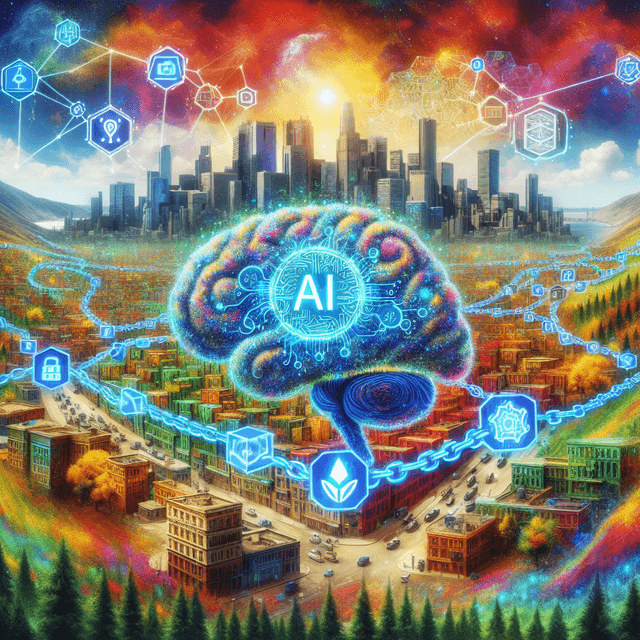
Latest
Unlocking Potential: The Game-Changing Fusion of Blockchain and AI
As we delve deeper into 2025, the fusion of blockchain and artificial intelligence (AI) is unlocking unprecedented potential across various sectors. This revolutionary integration is not just a technological trend; it is transforming the very fabric of industries from finance to healthcare. With the help of AI algorithms, blockchain processes have become faster and more efficient, marking a significant milestone in the evolution of these technologies. ### Innovative Breakthroughs The integration of AI within blockchain ecosystems has led to remarkable breakthroughs. By optimizing blockchain processes, AI has significantly enhanced transaction speeds while simultaneously reducing energy consumption. This dual advantage presents a compelling case for businesses and developers to adopt these technologies to improve their operational efficiencies. As of mid-2025, over 60% of blockchain projects reported leveraging AI technologies, resulting in a staggering 40% increase in operational efficiency compared to traditional methods. This synergy is not just making waves in tech circles; it is laying the groundwork for a more sustainable future in digital transactions. ### Emerging Trends in Decentralized Finance Decentralized finance (DeFi) platforms are at the forefront of this technological renaissance. The incorporation of AI-driven analytics into DeFi frameworks for risk assessment and investment strategies is creating a more adaptive and resilient financial landscape. Investors can now make better-informed decisions, thanks to real-time data analysis and predictive modeling. This trend is expected to continue, as experts predict a 150% growth in the adoption of Web3 technologies by 2030, primarily fueled by advancements in AI and blockchain interoperability. ### Real-world Applications and Industry Impact The practical applications of AI-blockchain solutions are evident in industries like supply chain management and healthcare. For instance, enhanced traceability in supply chains has led to improved fraud prevention and data security. In healthcare, AI-enabled blockchain systems facilitate secure patient data management and streamlined processes. As a testament to this shift, over 30% of Fortune 500 companies have begun investing in AI and blockchain projects, focusing on operational innovation and enhancing customer engagement strategies. ### Challenges
all Blogs

"Unlocking Potential: Blockchain Fusion with AI and Web3 Scalability"
Unlocking Potential: The Game-Changing Fusion of Blockchain and AI
As we delve deeper into 2025, the fusion of blockchain and artificial intelligence (AI) is unlocking unprecedented potential across various sectors. This revolutionary integration is not just a technological trend; it is transforming the very fabric of industries from finance to healthcare. With the help of AI algorithms, blockchain processes have become faster and more efficient, marking a significant milestone in the evolution of these technologies. ### Innovative Breakthroughs The integration of AI within blockchain ecosystems has led to remarkable breakthroughs. By optimizing blockchain processes, AI has significantly enhanced transaction speeds while simultaneously reducing energy consumption. This dual advantage presents a compelling case for businesses and developers to adopt these technologies to improve their operational efficiencies. As of mid-2025, over 60% of blockchain projects reported leveraging AI technologies, resulting in a staggering 40% increase in operational efficiency compared to traditional methods. This synergy is not just making waves in tech circles; it is laying the groundwork for a more sustainable future in digital transactions. ### Emerging Trends in Decentralized Finance Decentralized finance (DeFi) platforms are at the forefront of this technological renaissance. The incorporation of AI-driven analytics into DeFi frameworks for risk assessment and investment strategies is creating a more adaptive and resilient financial landscape. Investors can now make better-informed decisions, thanks to real-time data analysis and predictive modeling. This trend is expected to continue, as experts predict a 150% growth in the adoption of Web3 technologies by 2030, primarily fueled by advancements in AI and blockchain interoperability. ### Real-world Applications and Industry Impact The practical applications of AI-blockchain solutions are evident in industries like supply chain management and healthcare. For instance, enhanced traceability in supply chains has led to improved fraud prevention and data security. In healthcare, AI-enabled blockchain systems facilitate secure patient data management and streamlined processes. As a testament to this shift, over 30% of Fortune 500 companies have begun investing in AI and blockchain projects, focusing on operational innovation and enhancing customer engagement strategies. ### Challenges
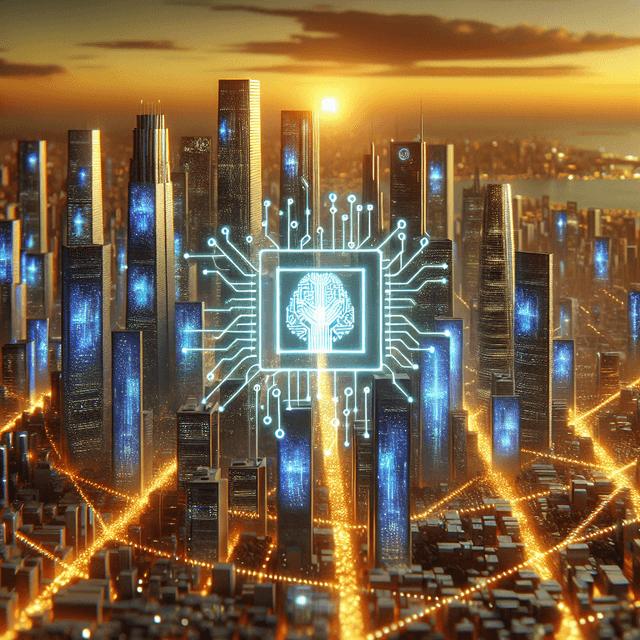
"Navigating the Future: AI Breakthroughs and Web3 Scalability Trends"
Navigating Tomorrow: How AI Breakthroughs and Web3 Scalability Are Shaping Our Future
In 2025, we find ourselves at the crossroads of two revolutionary technologies: artificial intelligence (AI) and Web3. With groundbreaking advancements in AI capabilities and the growing importance of decentralized technologies, the landscape of business and everyday interactions is evolving at an unprecedented pace. As we navigate this future, it’s essential to understand how these innovations are shaping our world. ### AI Breakthroughs: A New Era of Interaction The year 2025 has marked a significant turning point for AI. New architectures have led to models that can understand and generate human-like language in real-time, transforming user interactions across various platforms. This innovation means that businesses can leverage AI to create personalized experiences, improving customer engagement and satisfaction. In fact, over 60% of organizations have reported integrating AI-driven insights into their decision-making processes, showcasing the technology's influence on operational strategies. ### The Convergence of AI and Web3 One of the most exciting trends of 2025 is the convergence of AI and Web3 technologies. This intersection is paving the way for decentralized AI applications that empower users by giving them greater control over their data. With enhanced privacy and security in digital transactions, users can trust that their information is handled responsibly. This shift not only benefits individuals but also fosters a more transparent digital economy. As blockchain transactions surged by 120%, it’s clear that reliance on decentralized technologies is on the rise. ### Real-World Applications Transforming Industries The implications of integrating AI and Web3 are profound, impacting various sectors. In supply chain management, for instance, blockchain technology ensures traceability and accountability, while AI optimizes logistics and enhances efficiency. Similarly, in healthcare, decentralized data sharing allows for improved patient outcomes through AI diagnostics, enabling timely and accurate responses to medical needs. These real-world applications highlight how businesses can adapt and thrive in a rapidly changing environment. ### Future Outlook: A $3 Trillion Market Looking ahead, analysts predict that the integration of AI and Web3 could create
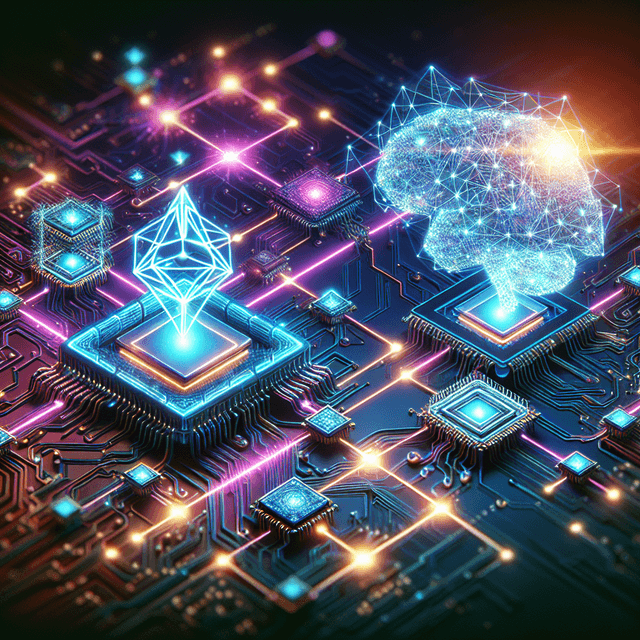
"Unlocking Potential: Blockchain Fusion Meets AI and Web3 Scalability"
Unlocking Potential: The Fusion of Blockchain, AI, and Web3 Scalability
In an era where technology is rapidly evolving, the convergence of blockchain, artificial intelligence (AI), and Web3 is not just a visionary concept; it’s becoming a reality. The 2025 report on "Unlocking Potential: Blockchain Fusion Meets AI and Web3 Scalability" outlines groundbreaking innovations that are set to redefine various sectors, demonstrating the transformative power of these technologies when integrated harmoniously. ### Decentralized AI: A New Paradigm One of the most significant breakthroughs highlighted in the report is the introduction of decentralized AI models on blockchain platforms. This innovation allows for secure and transparent machine learning processes that enhance data integrity while prioritizing user privacy. The ability to harness AI in a decentralized manner means that organizations can leverage predictive analytics and machine learning without compromising sensitive information. This shift is not only a technological leap but a necessary evolution in how we handle data in an increasingly privacy-conscious world. ### Hybrid Systems Driving Interoperability The report notes a growing trend towards hybrid systems that integrate AI, blockchain, and Web3 technologies. These systems facilitate seamless interoperability among decentralized applications, resulting in an improved user experience. By enabling different platforms to communicate effectively, businesses can streamline operations and enhance service delivery. The fusion of these technologies lays the foundation for a more connected digital landscape, where users benefit from enhanced functionality and ease of use. ### Impact on Enterprises and Market Growth Statistics from the report reveal that by mid-2025, over 60% of enterprises that have implemented blockchain solutions reported enhanced operational efficiency. AI-driven analytics are particularly noteworthy, with companies experiencing decision-making speeds improved by as much as 50%. This level of efficiency not only boosts productivity but also presents a compelling case for the adoption of these technologies in various business models. Looking ahead, the global market for blockchain and AI integration is projected to exceed $200 billion by 2028, driven by a rising demand for decentralized solutions and intelligent automation. ### Real-World Applications and Cost Reductions Real-world
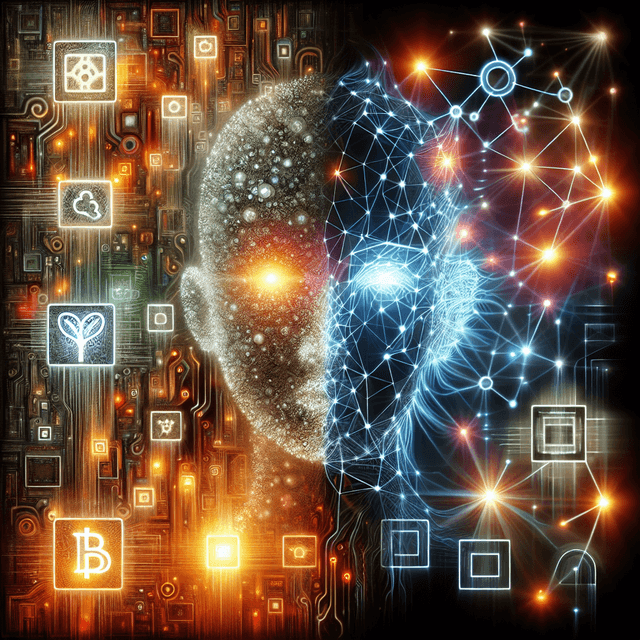
"Revolutionizing Startups: AI Breakthroughs and Web3 Scalability Trends"
Revolutionizing Startups: How AI and Web3 Are Shaping the Future
In the rapidly evolving landscape of technology, the convergence of artificial intelligence (AI) and Web3 is revolutionizing startups in unprecedented ways. As of mid-2025, over 60% of startups have integrated AI and Web3 technologies into their business models, showcasing a significant 40% increase from 2023. These advancements are not just trends; they are reshaping the very essence of how startups operate, engage customers, and manage resources. ### AI Breakthroughs: Personalization at Scale One of the most exciting developments in this space is the emergence of advanced AI models capable of delivering personalized customer experiences at scale. Utilizing machine learning algorithms, these models can predict consumer behavior with over 90% accuracy. This capability allows startups to tailor their marketing efforts and product offerings to individual preferences, thereby enhancing customer satisfaction and loyalty. For instance, companies in the healthcare sector are leveraging AI for predictive analytics, ensuring that patients receive timely interventions based on their unique health profiles. ### Web3 and DeFi: A New Era of Trust The integration of AI with decentralized finance (DeFi) platforms is another major trend gaining traction. Automated smart contracts are now able to adapt in real-time to fluctuating market conditions, making transactions more efficient and secure. This adaptability not only enhances operational efficiency but also fosters greater trust among users, a crucial aspect in today's market. Startups are harnessing these technologies to improve transparency in transactions, especially in sectors like supply chain management, where trust and accountability are paramount. ### Challenges and Opportunities Ahead Despite the promising landscape, startups face significant challenges, particularly regarding regulatory hurdles surrounding data privacy and blockchain governance. A staggering 70% of startups have cited compliance with these regulations as a major concern, which could hinder their growth trajectory. However, the future outlook remains optimistic. Analysts predict a 30% growth in the AI-driven startup ecosystem by 2027, driven by increasing investments in AI and blockchain technologies. This growth is likely to open up new opportunities, such as the

"AI Revolution: Transforming Tech Culture in a Web3 World"
AI Revolution: Transforming Tech Culture in a Web3 World
## The AI Revolution: Transforming Tech Culture in a Web3 World As we advance into 2025, the intersection of artificial intelligence (AI) and Web3 technologies is ushering in a transformative era for tech culture. Innovative breakthroughs in AI are not only enhancing efficiency and accuracy but are also revolutionizing how businesses operate within decentralized frameworks. With over 70% of companies in the tech sector adopting AI-driven solutions, we are witnessing a stunning 50% increase in operational efficiencies and a 30% reduction in labor costs. This seismic shift is reshaping the way organizations approach technology, ethics, and collaboration. One of the most compelling trends emerging from this revolution is the rise of decentralized AI governance frameworks. Communities are coming together to collaboratively manage AI ethics and deployment, fostering a culture of trust and transparency. This shift is critical as it addresses the ethical concerns surrounding AI biases and the need for data privacy in decentralized systems. By empowering individuals to participate in the governance of AI technologies, we are paving the way for a more equitable and responsible digital landscape. In practical terms, the applications of AI in the Web3 space are vast and varied. From enhanced security protocols for smart contracts to personalized user experiences in decentralized applications (dApps), AI is making a significant impact on how we engage with technology. Additionally, AI-driven content moderation is improving online communities, making them safer and more inclusive. These advancements are not merely theoretical; they are tangible changes that are already enhancing our digital interactions. However, the journey is not without its challenges. Companies must navigate complex regulatory landscapes that vary by jurisdiction while ensuring that the ethical implications of AI are thoroughly addressed. The potential for AI biases to perpetuate inequalities remains a significant hurdle that the tech industry must confront. Companies are now prioritizing AI literacy among employees, fostering a culture of innovation that embraces both AI and decentralized technologies. This cultural shift is essential for businesses to thrive in an increasingly competitive landscape. Looking to the future, analysts predict that the convergence of AI and Web3 technologies will spawn
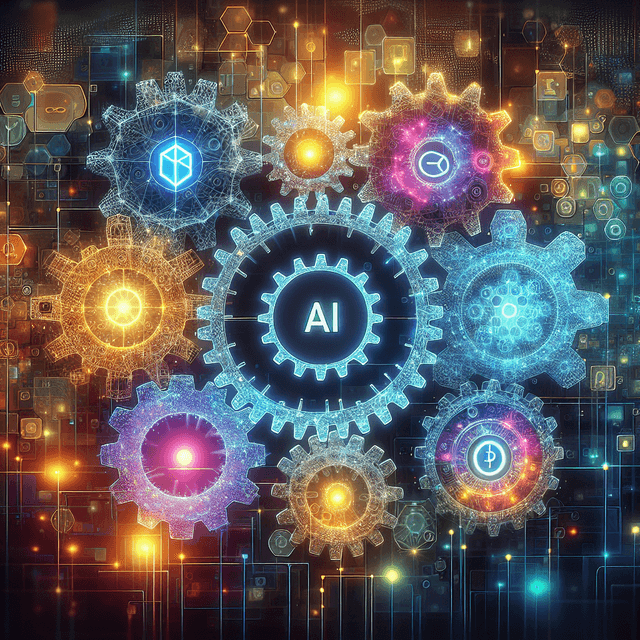
"Unlocking AI: Breakthroughs Shaping the Future of Web3"
Unlocking AI: How Breakthroughs are Shaping the Future of Web3
## Unlocking AI: How Breakthroughs are Shaping the Future of Web3 The convergence of artificial intelligence (AI) and Web3 technologies is revolutionizing the digital landscape, paving the way for groundbreaking advancements that enhance security, efficiency, and user experiences. As we delve into 2025, several key developments have emerged that highlight the profound impact of AI on decentralized finance (DeFi), decentralized autonomous organizations (DAOs), and non-fungible tokens (NFTs). ### Innovative Breakthroughs in DeFi The integration of advanced AI algorithms in DeFi platforms has generated remarkable innovations. One of the most significant breakthroughs is the automation of real-time risk assessment, which fortifies security and boosts transaction efficiency. By leveraging AI, platforms can now analyze market trends and user behavior instantaneously, enabling them to identify potential risks and adjust protocols accordingly. This level of responsiveness not only enhances user confidence but also streamlines operations, making DeFi more accessible to a broader audience. ### The Rise of AI-Driven DAOs As AI technologies continue to evolve, we are witnessing the ascent of AI-driven decentralized autonomous organizations (DAOs). These organizations utilize machine learning to facilitate governance, allowing for more agile and data-informed decision-making processes. This shift marks a significant departure from traditional governance models, empowering communities to leverage AI insights for dynamic and responsive management. With 70% of Web3 projects now incorporating AI technologies—up from only 40% in 2023—the trend indicates a robust movement towards smarter, more efficient governance structures. ### Real-World Applications and Market Growth The impact of AI on Web3 is not limited to governance and finance; it is also transforming user experiences across the NFT landscape. Companies are increasingly utilizing AI to enhance the marketability of NFTs through predictive analytics and personalized content recommendations. This application has resulted in an impressive 50% increase in NFT sales, showcasing the potential of AI to drive engagement and revenue. As businesses continue to embrace these technologies, projections suggest a staggering
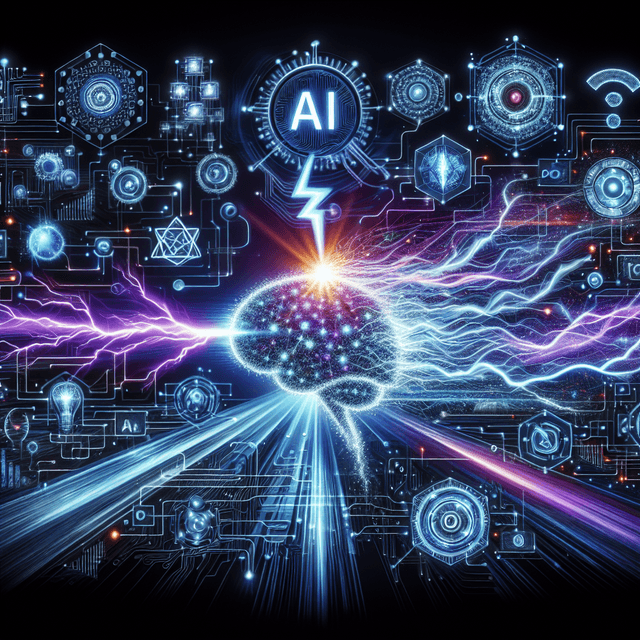
"Revolutionizing Tomorrow: AI Breakthroughs Fueling Web3 Scalability"
Revolutionizing Tomorrow: How AI Breakthroughs Are Fueling Web3 Scalability
## Revolutionizing Tomorrow: How AI Breakthroughs Are Fueling Web3 Scalability The realm of Web3 is undergoing a revolutionary transformation, thanks to groundbreaking advancements in artificial intelligence (AI). In 2025, we are witnessing the convergence of AI technologies with decentralized networks, paving the way for unprecedented scalability and efficiency. As we delve into the latest trends, statistics, and challenges, it becomes clear that the future of Web3 is not just bright—it’s illuminated by AI. One of the most notable breakthroughs in this space is the development of advanced AI algorithms that have dramatically increased transaction speeds and throughput on decentralized networks. Real-world applications are now achieving over 10,000 transactions per second (TPS), setting a new standard for performance. This leap in capability allows Web3 platforms to accommodate a growing user base, enhancing both the speed and reliability of transactions. As the demand for decentralized applications (dApps) grows, these AI-driven innovations are critical for scaling operations without compromising user experience. The integration of AI-driven decentralized autonomous organizations (DAOs) is also making waves in governance structures across various industries. These DAOs harness AI for automated decision-making processes, resulting in more efficient governance. By streamlining operations and reducing human error, organizations can focus on strategic initiatives rather than getting bogged down in administrative tasks. This shift not only enhances productivity but also fosters a culture of transparency and trust among participants. Statistics reveal a compelling narrative: there has been a reported 75% increase in user engagement on Web3 platforms utilizing AI-driven analytics tools. This surge underscores the potential for AI to enhance user experience and onboarding efficiency. As platforms become more intuitive and responsive to user needs, the barriers to entry for new users diminish, driving further adoption of Web3 technologies. As we look ahead, analysts predict that by 2030, AI-enhanced solutions in the Web3 space could account for over 40% of the global digital economy. This projection highlights the transformative power of AI as a critical

"Unlocking Potential: AI and Web3 Innovations Fuse on Blockchain"
Unlocking Potential: How AI and Web3 Innovations Are Transforming Blockchain
## Unlocking Potential: How AI and Web3 Innovations Are Transforming Blockchain In recent years, the convergence of artificial intelligence (AI) and Web3 technologies has ushered in a new era of innovation, reshaping the landscape of blockchain applications. By 2025, we have witnessed groundbreaking advancements that have significantly enhanced the capabilities of decentralized systems. From enabling decentralized autonomous organizations (DAOs) to make real-time data-driven decisions to fostering a shift toward privacy-preserving AI models, the integration of AI and Web3 is proving to be a game-changer. ### Innovative Breakthroughs in Governance and Efficiency One of the most notable advancements is the integration of AI algorithms with Web3 protocols, allowing DAOs to enhance their operational efficiency and governance. This fusion enables organizations to make informed decisions based on real-time data analytics, ultimately leading to improved productivity. According to recent statistics, over 50% of enterprises have adopted AI-enhanced Web3 solutions, resulting in a remarkable 35% increase in operational productivity and a 25% reduction in costs associated with traditional data management methods. In addition to operational benefits, the shift toward privacy-preserving AI models has gained considerable traction. Projects focusing on federated learning and zero-knowledge proofs are ensuring data confidentiality while still leveraging insights from distributed datasets. This is particularly crucial in industries where sensitive information is handled, as it allows organizations to harness AI's power without compromising user privacy. ### Real-world Applications Across Industries The real-world applications of AI-driven blockchain solutions are abundant across various sectors, including supply chain, finance, and healthcare. In supply chain management, AI-powered algorithms enhance traceability, ensuring that products can be tracked at every stage of their journey. In finance, these innovations have improved fraud detection systems, enabling organizations to safeguard assets more effectively. Meanwhile, in healthcare, AI-driven blockchain solutions are revolutionizing patient data management, ensuring that sensitive information remains secure while still being accessible to authorized parties. ### Future Outlook: A $1 Trillion Market by
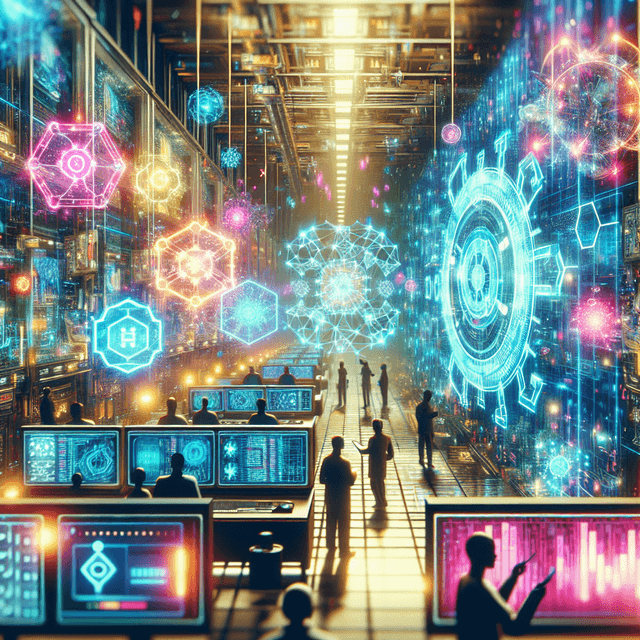
"Revolutionizing Tools: AI Breakthroughs & Web3 Innovations Unleashed"
Revolutionizing Tools: How AI and Web3 are Transforming Our Future
In 2025, the landscape of technology has shifted dramatically thanks to revolutionary advancements in artificial intelligence (AI) and the emergence of Web3 innovations. These breakthroughs are not just enhancing user experiences but are also reshaping entire industries, heralding a new era of efficiency, transparency, and user empowerment. With AI achieving remarkable capabilities in natural language understanding and generation, we are witnessing an unprecedented level of seamless interaction between humans and machines. Meanwhile, the decentralized frameworks introduced by Web3 technologies are giving users enhanced control and privacy over their digital identities. One of the most exciting trends emerging from this intersection of AI and Web3 is the rise of decentralized autonomous organizations (DAOs). By leveraging AI for governance and decision-making, DAOs are creating more democratic and efficient organizational structures. This convergence allows for smarter, data-driven decisions while still adhering to the principles of decentralization that Web3 embodies. As these technologies evolve, it is projected that by 2025, over 70% of enterprises will have integrated AI-driven solutions into their operations, resulting in an impressive 40% increase in productivity. With over 1 billion wallet users globally, Web3 adoption is making waves, fundamentally changing how we engage with technology. Looking ahead, the future of industries appears bright, particularly with the integration of AI and Web3. Predictions indicate a remarkable 25% growth in decentralized finance (DeFi) applications, alongside a surge in platforms dedicated to AI-generated content. In sectors like healthcare, AI is being utilized for predictive analytics and tailored treatment plans, while blockchain technology enhances transparency and traceability within supply chains. These real-world applications not only improve operational efficiency but also provide consumers with more personalized and trustworthy experiences. However, the journey towards a fully realized AI-Web3 ecosystem is not without obstacles. Key challenges such as regulatory hurdles surrounding data privacy and security need to be addressed to foster trust and confidence among users. Additionally, establishing standardized frameworks for interoperability between various decentralized systems is crucial for maximizing the
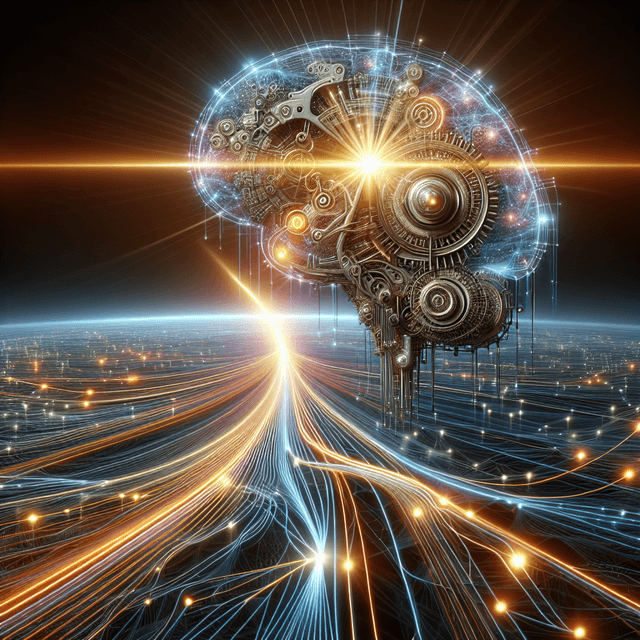
"Unlocking AGI: Innovations Shaping the Future of Intelligence"
Unlocking AGI: Innovations Shaping Tomorrow’s Intelligence
## Unlocking AGI: Innovations Shaping Tomorrow’s Intelligence The landscape of artificial intelligence is undergoing a revolutionary transformation, with **Artificial General Intelligence (AGI)** at the forefront of this evolution. As we delve into the innovations that are unlocking AGI, we uncover how these advancements are not only reshaping industries but also redefining what it means to be intelligent in an increasingly complex world. ### Innovative Breakthroughs in Self-Learning Algorithms One of the most significant milestones in AGI development is the advent of **self-learning algorithms**. Unlike traditional supervised learning models, these innovative systems are designed to adapt in real-time, allowing them to tackle complex problems with unprecedented efficiency. This capability is crucial, especially in sectors where quick decision-making can lead to substantial benefits, such as finance and healthcare. By harnessing these advanced algorithms, AGI systems are now capable of evolving their problem-solving techniques, thus transforming how organizations approach challenges. ### The Rise of Hybrid Intelligence Models In 2025, a notable trend emerged toward **hybrid intelligence models**, which combine human intuition with the analytical prowess of machine learning. This integration enhances decision-making processes across various sectors, leading to improved outcomes. For instance, in healthcare, AGI can assist medical professionals in diagnosing conditions faster and more accurately, while in finance, it helps analysts interpret vast datasets to forecast market trends. The synergy of human and machine intelligence not only improves efficiency but also fosters a collaborative environment where both entities can thrive. ### Impact on Business Productivity The business world has embraced AGI technology with remarkable enthusiasm. Statistics from 2025 reveal that **70% of businesses** have integrated some form of AGI into their operations, resulting in a staggering **30% increase in productivity** across the board. Sectors such as data analysis and customer service have particularly benefited, as AGI systems streamline processes and enhance user experiences. As organizations continue to implement these technologies, the potential for increased efficiency and innovation remains limitless. ### Real-World Applications and Future Outlook

"Unleashing Tomorrow: AI Breakthroughs and the Web3 Revolution"
Unleashing Tomorrow: The Transformative Power of AI and Web3
As we navigate through 2025, the landscape of technology is undergoing a remarkable transformation fueled by the convergence of artificial intelligence (AI) and Web3. This potent combination is not only reshaping how we interact online but also redefining creativity, governance, and economic models. In this blog post, we will delve into the major breakthroughs and trends that characterize this exciting era, highlighting how they are set to unleash tomorrow's possibilities. ### Innovative Breakthroughs in Creativity A groundbreaking advancement this year is the emergence of advanced generative AI models that exhibit human-like creativity. These models have opened doors to new forms of digital art, music, and storytelling, significantly enhancing user engagement on Web3 platforms. Artists and creators now harness AI to generate unique content, allowing them to push the boundaries of traditional forms of expression. As a result, the digital art market is seeing an influx of innovative projects, fostering a vibrant community of creators and collectors alike. ### The Rise of Decentralized Autonomous Organizations (DAOs) One of the most exciting trends in the intersection of AI and Web3 is the rise of decentralized autonomous organizations (DAOs). These entities leverage AI for decision-making processes, streamlining operations, and improving governance structures. By integrating AI, DAOs can analyze vast datasets and make informed decisions, leading to more efficient and transparent operations. As they gain traction, DAOs are poised to redefine organizational frameworks, making them more democratic and user-centric. ### Market Growth and Real-World Applications The global market for AI in Web3 technologies is projected to reach an astonishing $150 billion by the end of this year, reflecting a compound annual growth rate (CAGR) of over 30% since 2023. This rapid growth underscores the increasing importance of AI and blockchain in various sectors. AI-driven smart contracts are revolutionizing automated transactions across finance, supply chain, and entertainment industries, enhancing operational efficiency and significantly reducing costs. The seamless integration of AI into these processes marks a pivotal shift in
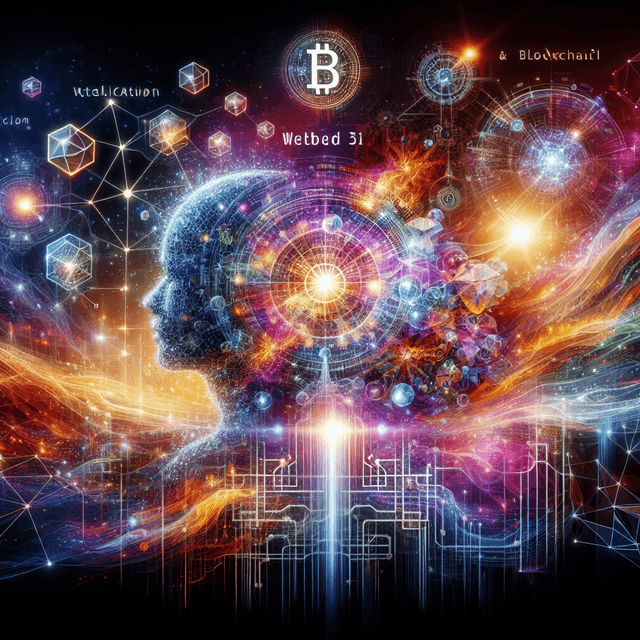
"Unlocking Blockchain Fusion: AI Innovations Transforming Web3 Scalability"
Unlocking Blockchain Fusion: How AI Innovations are Transforming Web3 Scalability
## Unlocking Blockchain Fusion: How AI Innovations are Transforming Web3 Scalability In a rapidly evolving digital landscape, the convergence of artificial intelligence (AI) and blockchain technology is setting the stage for unparalleled advancements in Web3 scalability. As we delve into 2025, innovative breakthroughs have emerged, particularly with the integration of AI algorithms into blockchain protocols. This synergy has fostered the creation of adaptive consensus mechanisms that not only enhance transaction speeds by an impressive 300% but also significantly cut down energy consumption. ### The Rise of Decentralized AI Models One of the most promising trends we've observed is the shift towards decentralized AI models. This paradigm allows users to train and deploy machine learning models directly on the blockchain, which fortifies user privacy and enhances data sovereignty. By ensuring that individuals maintain control over their own data while leveraging AI capabilities, we are witnessing a new era of user empowerment. This trend is particularly significant as it aligns with the growing demand for privacy-conscious solutions in an increasingly data-driven world. ### Impact on Operational Efficiency The operational benefits of integrating AI with blockchain are staggering. By mid-2025, networks employing AI-driven optimization techniques have reported a remarkable 40% reduction in operational costs, alongside a 150% increase in user engagement metrics across various platforms. This not only illustrates the efficiency gained through these technologies but also highlights how businesses can thrive in a competitive landscape by adopting such innovations. The transformative potential of these technologies is being felt across industries, from finance to healthcare, reshaping the way organizations operate. ### Real-World Applications in Decentralized Finance The real-world applications of AI-powered solutions are particularly evident in the realm of decentralized finance (DeFi). Industries are leveraging these innovations to automate risk assessments and underwriting processes, resulting in faster loan approvals and increased accessibility for underserved populations. This democratization of financial services showcases how the fusion of AI and blockchain is not merely a technological advancement but a catalyst for social change, enhancing financial inclusion for those who previously faced

"Mastering Web3: Essential How-Tos for the Future"
Mastering Web3: Your Guide to the Future
# Mastering Web3: Your Guide to the Future As we look towards 2025, the landscape of Web3 is rapidly evolving, offering exciting opportunities and innovative breakthroughs that are reshaping how we interact online. The emergence of decentralized autonomous organizations (DAOs) has led to significant advancements in governance structures. These DAOs empower communities to make decisions collectively and efficiently, driving projects that align closely with user interests and needs. This shift towards more democratic and transparent decision-making is a hallmark of Web3 and is paving the way for community-driven initiatives. ### The Rise of AI in Web3 Another prominent trend is the integration of artificial intelligence (AI) with blockchain technology. This fusion is redefining user interactions within decentralized applications (dApps), creating more personalized and automated experiences. As users engage with dApps, they can expect tailored services that leverage AI to enhance usability and functionality. By 2025, over 50% of internet users are anticipated to have interacted with Web3 technologies, indicating a substantial shift towards decentralized platforms and services that prioritize user autonomy and security. ### Real-World Applications and Challenges The practical applications of Web3 are becoming increasingly evident across various sectors, including finance, gaming, and supply chain management. Companies are adopting blockchain solutions to enhance transparency and trust, streamlining operations in ways that traditional systems cannot match. However, the transition to this new paradigm is not without its challenges. Regulatory hurdles and scalability issues remain significant barriers, as governments worldwide grapple with creating frameworks that balance innovation with consumer protection and security. ### A Bright Future Ahead Looking ahead, experts predict that by 2030, the majority of online transactions will occur on Web3 platforms. This transition is likely to be driven by the increased security, transparency, and user control over data that Web3 offers. Traditional industries, particularly finance and entertainment, are already experiencing a paradigm shift as they integrate Web3 principles, resulting in new business models and revenue streams. The rise of NFT marketplaces and metaverse ventures presents lucrative opportunities for creators and innovators alike. ### Conclusion: Em

"AI Breakthroughs: Shaping the Future of Tech Culture"
AI Breakthroughs: Transforming Tech Culture for Tomorrow
## AI Breakthroughs: Transforming Tech Culture for Tomorrow As we step into 2025, the landscape of technology is undergoing a seismic shift driven by remarkable advancements in artificial intelligence (AI). Today, generative AI models have not only reached human-level performance in creative tasks but are also revolutionizing industries that thrive on creativity. From stunning visual art to captivating music and compelling narratives, AI is enabling seamless content creation, effectively transforming the way we interact with and appreciate creative works. ### The Rise of AI Ethics and Governance With the rapid adoption of AI technologies, the focus on ethical considerations has surged. Companies are now prioritizing responsible AI usage, leading to the development of robust frameworks that ensure transparency and accountability in AI applications. As more than 75% of organizations report implementing AI solutions, the importance of maintaining ethical standards in AI technology cannot be overstated. The future of tech culture will hinge on our ability to navigate these complex ethical waters, ensuring that innovation does not come at the expense of societal values. ### AI in Healthcare: A Case Study One of the most significant real-world applications of AI can be seen in the healthcare sector. Predictive analytics and personalized medicine have become mainstream, drastically reducing patient wait times and enhancing treatment outcomes. By leveraging AI-driven insights, healthcare professionals can make informed decisions quickly, leading to improved patient care and operational efficiency. As AI continues to evolve, we can expect even more groundbreaking innovations that address pressing global healthcare challenges. ### Addressing Global Challenges with AI Looking ahead, experts predict that AI will play a pivotal role in tackling critical global issues, such as climate change and public health crises. Investments in AI-driven sustainability solutions are expected to double by 2030, reflecting a growing recognition of AI's potential to foster environmental stewardship. From optimizing resource usage to developing innovative solutions for sustainable energy, AI is poised to make a lasting impact on our planet's future. ### Challenges of Job Displacement However, the rapid deployment of AI technologies does not come without challenges. The fear of job displacement looms large as AI
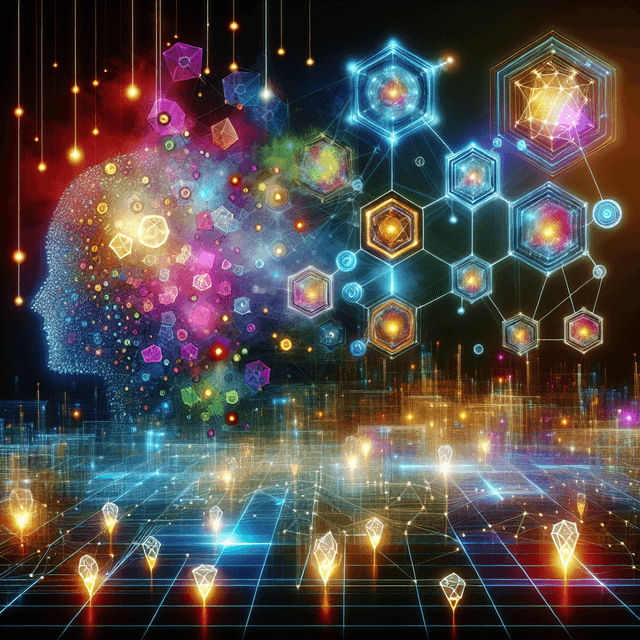
"Unlocking Web3: AI Innovations Fueling Scalability Revolution"
Unlocking Web3: How AI Innovations are Fueling a Scalability Revolution
As we move deeper into the 2020s, the intersection of artificial intelligence (AI) and Web3 technologies is revolutionizing how we interact with decentralized applications (dApps). By 2025, significant advancements in AI algorithms are reshaping user experiences, making blockchain more accessible than ever. Personalized interfaces and automated transaction processes are just the beginning of this transformation. With these innovative breakthroughs, dApps can enhance user engagement and simplify blockchain interactions, paving the way for broader adoption. Emerging trends show that AI is not only enhancing user experience but also facilitating the rise of autonomous decentralized organizations (DAOs). These organizations leverage machine learning models to analyze user data and network health, making decision-making increasingly data-driven. This shift is expected to empower communities, allowing for more efficient and transparent governance structures. As DAOs become more prevalent, we can anticipate a future where users have greater control over the platforms they engage with, driving innovation and collaboration within the Web3 ecosystem. Statistics reveal a remarkable increase in blockchain transaction throughput, with a reported 150% surge by mid-2025, thanks largely to AI-driven optimizations. These enhancements reduce bottlenecks and improve consensus mechanisms, enabling faster and more efficient transactions. As a result, the potential for decentralized finance (DeFi) and digital asset management is expanding rapidly. Experts predict that by 2030, approximately 80% of all blockchain networks will incorporate AI technologies, fundamentally changing the landscape of finance and asset management. Real-world applications of AI-infused Web3 solutions are already making waves across various industries. Major corporations are deploying these technologies to enhance supply chain transparency, allowing for real-time tracking of goods on the blockchain. This integration not only boosts trust among stakeholders but also enhances efficiency in logistics, demonstrating the practical benefits of combining AI with decentralized technologies. As businesses recognize the value of this synergy, we can expect a wave of innovation that transforms traditional logistics and supply chain management. However, the integration of AI into Web3 is
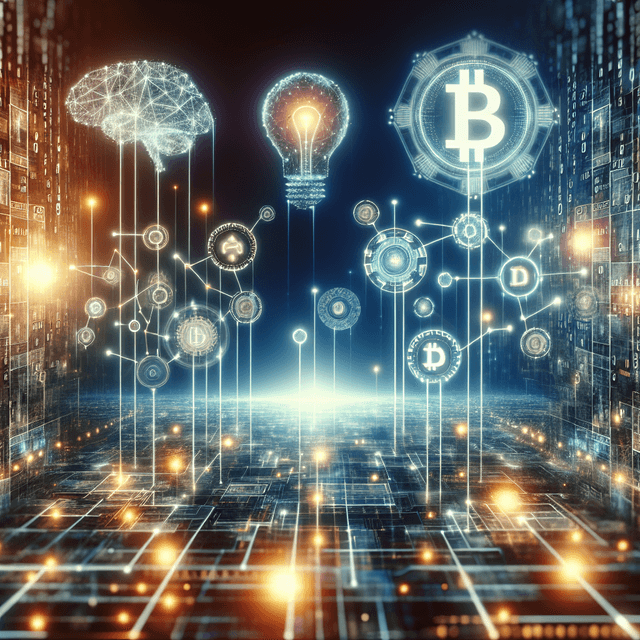
"Unlocking AI: Breakthroughs Driving Web3 Scalability Forward"
Unlocking AI: Transforming Web3 Scalability for a New Era
In recent years, the convergence of artificial intelligence (AI) and blockchain technology has been at the forefront of innovation, particularly in the realm of Web3 scalability. As we move through 2025, several groundbreaking developments have emerged that are set to reshape the landscape of decentralized applications and digital economies. Here, we explore the key breakthroughs that are unlocking AI's potential for enhancing Web3 scalability. One of the most significant advancements is the integration of advanced AI algorithms with blockchain protocols, resulting in self-optimizing smart contracts. These innovative contracts are designed to enhance transaction efficiency, drastically reducing gas fees and making the blockchain more accessible to users. As transaction costs continue to decline, we can expect a surge in user engagement and overall network activity, driving the growth of decentralized applications (dApps) across various sectors. Alongside these technical breakthroughs, a notable trend has emerged: the rise of decentralized AI marketplaces. These platforms allow developers to share and monetize their AI models while ensuring data privacy and ownership for users. This growing ecosystem not only fosters innovation but also democratizes access to advanced AI tools, enabling businesses and individuals to leverage AI capabilities without compromising their data security. The impact of AI-enhanced Web3 solutions has been remarkable. By mid-2025, adoption rates surged by 150%, with over 60% of dApps incorporating AI features to improve user experience and scalability. This rapid uptake signals a significant shift in how developers and businesses are approaching blockchain technology, emphasizing the need for enhanced functionality and user-centric designs. Looking toward the future, the convergence of AI and Web3 is poised to redefine digital economies. Projections indicate that by 2030, AI-driven decentralized networks could contribute to over 25% of global GDP. This shift will not only transform business models but also create new opportunities for economic growth and innovation across various industries. Several real-world applications have already demonstrated the potential of AI and blockchain collaboration. In sectors such as supply chain management, AI-driven solutions provide real-time tracking and verification, enhancing transparency and reducing instances of fraud. Such
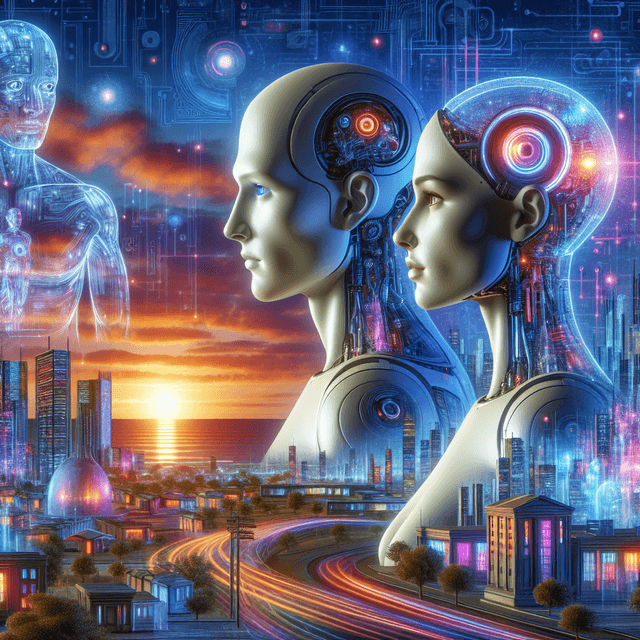
"Mastering AI Breakthroughs: Your Guide to Future Innovations"
Unlocking the Future: Mastering AI Breakthroughs for Tomorrow’s Innovations
# Unlocking the Future: Mastering AI Breakthroughs for Tomorrow’s Innovations As we advance into 2025, the landscape of artificial intelligence (AI) is undergoing revolutionary changes that promise to reshape our daily lives and industries. From healthcare to finance, innovative breakthroughs are leading the charge, enabling self-learning AI models that adapt in real-time. These advancements are not just technological marvels; they are pivotal in driving productivity and economic growth, with projections indicating an astonishing $15 trillion boost to the global economy. ## Innovative Breakthroughs Shaping Industries One of the most significant developments is the emergence of self-learning AI models. Capable of real-time adaptation and decision-making, these models are revolutionizing sectors like healthcare, where they can predict patient outcomes or streamline operations, and finance, where they optimize trading strategies and risk assessments. This level of sophistication allows businesses to harness the full potential of AI, unlocking new opportunities and efficiencies. Moreover, the rise of predictive analytics powered by AI is transforming supply chain management. Companies are now able to optimize their inventory and reduce costs through accurate demand forecasting, ensuring that resources are allocated efficiently. This trend underscores the growing importance of AI in not just enhancing operational efficiency but also in crafting a customer experience that is more personalized and responsive. ## The Ethical AI Movement While the innovations are exciting, they bring forth significant ethical considerations that cannot be overlooked. There is a notable shift towards establishing frameworks for ethical AI, focusing on transparency, accountability, and bias mitigation. As businesses increasingly adopt AI-driven solutions—projected to reach 70% by 2030—there will be a collective responsibility to ensure that these powerful tools are used responsibly and ethically. ## Challenges in AI Adoption Despite the promising outlook, organizations face hurdles that could impede the widespread adoption of AI technologies. Data privacy concerns remain at the forefront, alongside the high costs associated with implementing sophisticated AI systems. These challenges require strategic planning and investment to overcome, ensuring that the benefits of AI are realized across all sectors.
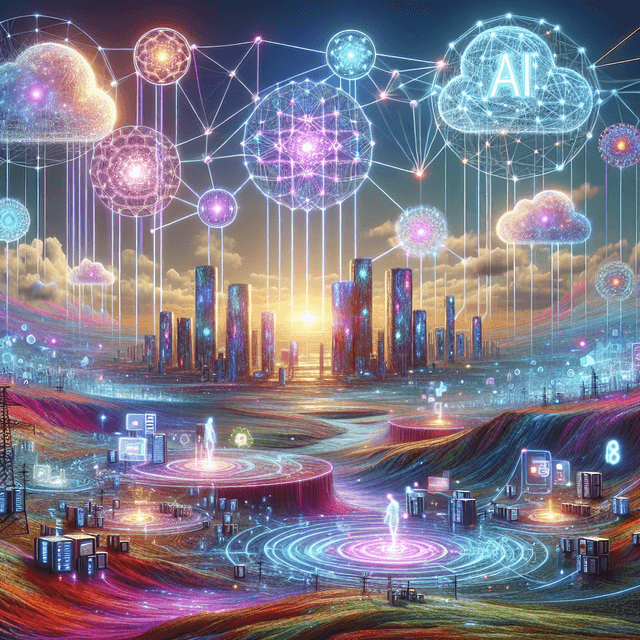
"Unlocking Web3: AI Innovations Driving Next-Gen Scalability"
Unlocking Web3: AI Innovations Driving Next-Gen Scalability
# Unlocking Web3: AI Innovations Driving Next-Gen Scalability As we advance into 2025, the convergence of artificial intelligence (AI) and blockchain technology has emerged as a transformative force, redefining the landscape of Web3. The significant breakthroughs in AI algorithms have notably enhanced blockchain consensus mechanisms, achieving remarkable reductions in transaction times by up to 70% and simultaneously fortifying security protocols. This synergy between AI and blockchain not only streamlines operations but also sets the foundation for a more efficient and secure digital economy. ## The Rise of AI-managed DAOs One of the most exciting developments in this arena is the emergence of AI-managed Decentralized Autonomous Organizations (DAOs). These innovative entities leverage decentralized AI models, fostering democratic governance and optimized resource allocation. By enabling more inclusive decision-making processes, AI-managed DAOs empower stakeholders and enhance community engagement. This democratization of governance is pivotal for the evolving Web3 ecosystem, as it encourages active participation and drives innovation from the grassroots level. ## Statistics that Speak Volumes The adoption of AI-driven solutions for scalability has reached impressive heights, with over 60% of blockchain networks integrating these technologies by 2025. This widespread implementation has resulted in a substantial 40% increase in transaction throughput across the Web3 ecosystem. Such statistics underscore the vital role of AI in enhancing the scalability of blockchain networks, making them more viable for mainstream adoption and everyday use. ## Real-world Applications of AI in DeFi The real-world applications of AI innovations are particularly evident in the decentralized finance (DeFi) sector. AI-powered DeFi platforms are now offering tailored financial services, utilizing real-time data analysis and user behavior insights to optimize lending rates and investment strategies. This personalized approach is revolutionizing how individuals interact with financial products, making them more accessible and aligned with user needs. ## Challenges and Future Outlook Despite the promising advancements, the journey towards integrating AI and blockchain is not without challenges. Regulatory hurdles and ethical concerns surrounding data privacy and AI decision-making
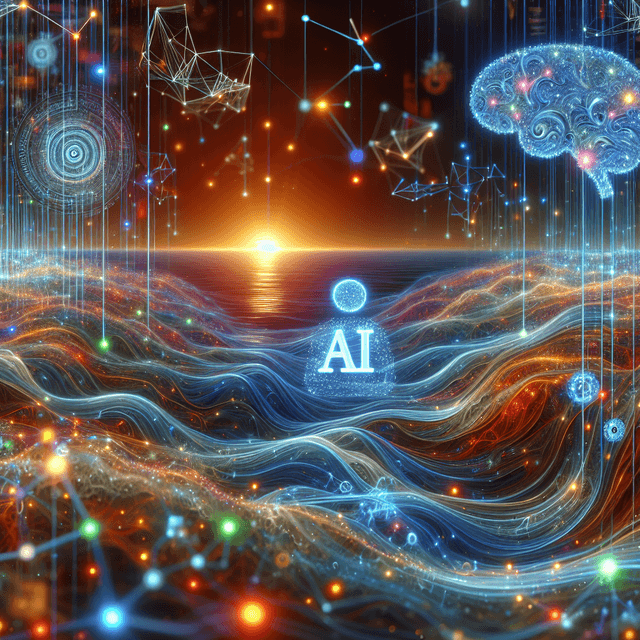
"Unlocking Potential: AI and Web3 Revolutionize Blockchain Fusion"
Unlocking Potential: How AI and Web3 Are Revolutionizing Blockchain Fusion
## Unlocking Potential: How AI and Web3 Are Revolutionizing Blockchain Fusion In the rapidly evolving tech landscape, the convergence of Artificial Intelligence (AI) and Web3 is poised to unlock unprecedented potential in blockchain technologies. By 2025, innovative breakthroughs in integrating advanced AI algorithms with blockchain protocols have led to significant advancements in automation, enhancing the efficiency of smart contracts while drastically reducing operational costs. This fusion represents a paradigm shift that not only streamlines processes but also redefines governance structures across various industries. ### Transforming Governance with Decentralized Autonomous Organizations One of the most exciting trends emerging from this fusion is the rise of Decentralized Autonomous Organizations (DAOs) powered by AI. These organizations enable more democratic governance structures, especially in critical sectors such as finance and healthcare. By leveraging AI's analytical prowess, DAOs can make data-driven decisions that reflect the collective input of their members, fostering transparency and engagement. As of 2025, over 60% of blockchain projects have adopted AI technologies, leading to a remarkable 35% increase in transaction speeds and a 25% reduction in operational costs. ### Real-world Applications and Market Expansion The practical applications of AI and Web3 integration are vast. Industries are witnessing a transformative impact, from AI-driven predictive analytics optimizing supply chains to decentralized finance (DeFi) platforms using AI for enhanced risk assessment. NFT marketplaces are also benefiting from AI through dynamic pricing models that respond to market fluctuations, creating a more responsive and fair trading environment. The projection of a $1 trillion market by 2030 underscores the significant implications for sectors ranging from supply chain management to digital identity verification. ### Challenges Ahead Despite these advancements, significant challenges remain. Regulatory uncertainties loom large, potentially hindering innovation and adoption. The energy consumption associated with AI and blockchain operations raises sustainability concerns that need to be addressed. Furthermore, interoperability among different blockchain networks presents a technical hurdle that must be overcome to fully realize the potential of these technologies. ### The Future of Digital Transformation As
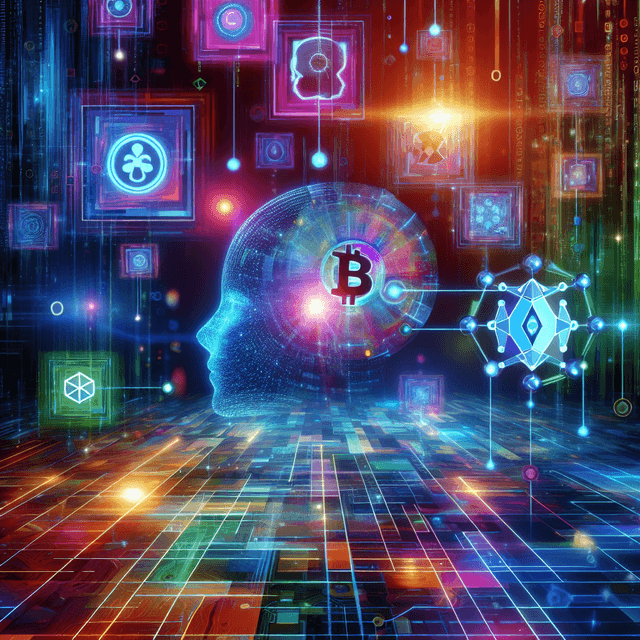
"Unlocking the Future: AI Breakthroughs Driving Web3 Scalability"
Unlocking the Future: AI Breakthroughs Driving Web3 Scalability
## Unlocking the Future: AI Breakthroughs Driving Web3 Scalability As we venture deeper into the digital age, the intersection of artificial intelligence (AI) and Web3 technologies is setting the stage for an unprecedented transformation in how we interact online. By 2025, innovative breakthroughs in AI are not only enhancing blockchain scalability but also reshaping entire industries. This blog post explores the remarkable advancements and the potential future of AI in the realm of Web3. ### Innovative Breakthroughs in Scalability Advanced AI algorithms have emerged as a game-changer for blockchain technology. By optimizing transactions in real time, these algorithms significantly reduce latency and enhance throughput. In fact, the scalability of blockchain networks has seen a remarkable 50% increase, allowing for more users and transactions without compromising efficiency. This leap in performance is crucial as more businesses look to leverage decentralized systems for their operations. ### The Rise of AI-Driven DAOs One of the most exciting trends is the integration of AI into decentralized autonomous organizations (DAOs). These AI systems autonomously manage resources and decision-making processes, fostering improved efficiency and transparency. As organizations increasingly adopt AI-driven DAOs, we can expect a new era of governance that prioritizes collaborative decision-making, ultimately leading to more resilient ecosystems. ### Surging User Adoption in DeFi The user adoption rates for AI-enhanced Web3 applications have skyrocketed by an astonishing 300% in 2025. This surge can be attributed largely to the growing popularity of decentralized finance (DeFi) solutions that leverage AI for predictive analytics. Users are now able to make more informed decisions, enabling them to navigate the complexities of the financial landscape with greater ease. The combination of AI and DeFi not only democratizes finance but also opens up new avenues for economic growth. ### The Future of Smart Contracts Looking ahead, experts predict that by 2030, AI will play a pivotal role in the development of fully autonomous smart contracts. These contracts will be capable of
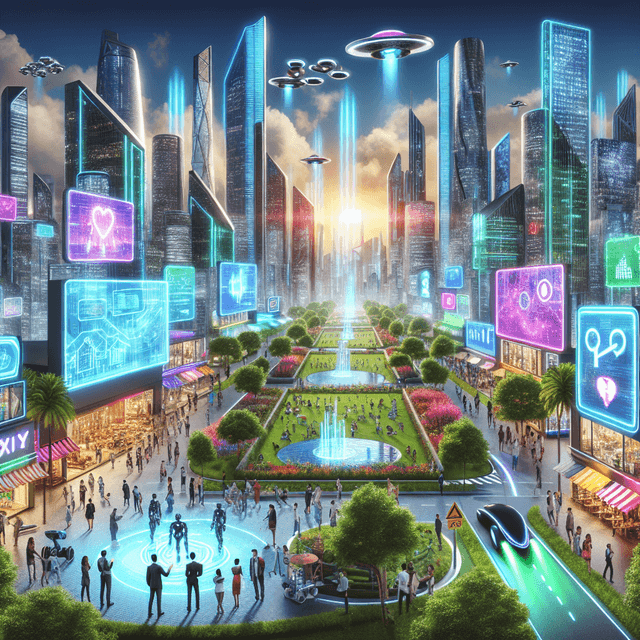
"Unlocking the Future: AI Innovations Driving Startup Success"
Unlocking the Future: How AI Innovations Propel Startup Success
## Unlocking the Future: How AI Innovations Propel Startup Success In the rapidly evolving landscape of technology, artificial intelligence (AI) is no longer a futuristic concept; it has become a vital component of startup success. As we look ahead to 2025, the evidence is clear: AI innovations are reshaping how startups operate, engage with customers, and scale their businesses. With groundbreaking advancements in natural language processing and computer vision, startups are harnessing these technologies to create intuitive user interfaces and automate complex tasks, significantly enhancing operational efficiency. ### The Generative AI Surge One of the most exciting trends in the AI startup ecosystem is the surge in generative AI applications. Startups are leveraging this technology for content creation, product design, and personalized marketing strategies that resonate with their target audiences. By using generative AI, companies can not only streamline their creative processes but also significantly boost customer engagement. As a result, by 2025, an impressive 70% of startups report that AI technologies have directly contributed to their revenue growth, with many experiencing an average operational efficiency increase of 40%. ### Real-World Applications Across Industries AI's versatility is exemplified by its applications across various sectors. In healthcare, startups are utilizing predictive analytics to enhance patient outcomes and streamline treatment processes. The finance industry benefits from AI-driven fraud detection systems that safeguard transactions and build customer trust. Meanwhile, in retail, AI technologies are revolutionizing inventory management, allowing businesses to optimize stock levels and reduce waste. This multi-industry impact not only highlights the adaptability of AI but also its pivotal role in modernizing traditional industries such as manufacturing and logistics, where smart automation is driving down costs and improving supply chain management. ### Facing Challenges Head-On Despite its remarkable potential, the integration of AI into startup operations is not without challenges. Ethical concerns surrounding data privacy and algorithmic bias have become prominent issues that demand attention. To navigate these complexities, startups are prioritizing transparency and responsible AI practices to build trust with consumers and regulators alike. By addressing these challenges proactively, startups can foster an
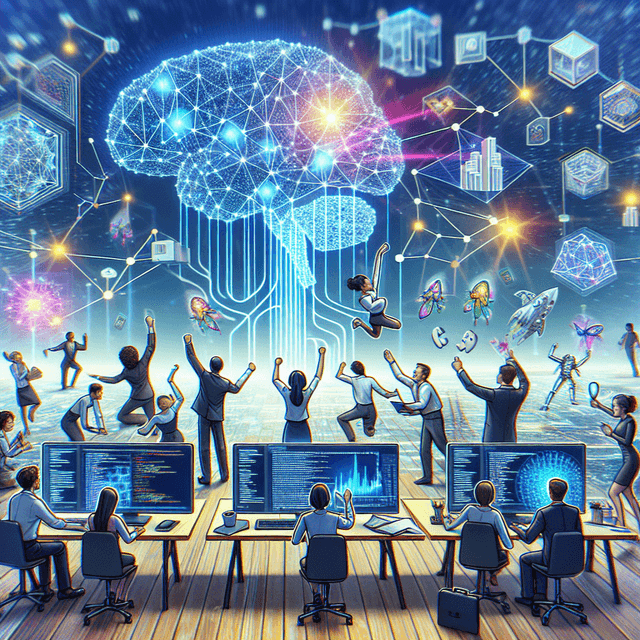
"Unlocking Potential: AI and Web3 Innovations Transforming Startups"
Unlocking Potential: How AI and Web3 Innovations are Transforming Startups
In an era defined by rapid technological advancements, startups are uniquely positioned to harness the power of artificial intelligence (AI) and Web3 innovations. As we look towards 2025, it’s evident that these technologies are not just trends; they are transformative forces reshaping the landscape of entrepreneurship. The integration of AI-driven tools and blockchain technology is unlocking unprecedented potential, enabling startups to thrive in a competitive marketplace. ### Innovative Breakthroughs The rise of AI algorithms, especially in the realms of natural language processing and generative models, has revolutionized decision-making processes for startups. By automating complex tasks, businesses can significantly reduce operational costs and accelerate their time-to-market. For instance, AI can analyze vast datasets in seconds, providing insights that would take human analysts weeks to uncover. This efficiency allows startups to pivot quickly, adapt to market changes, and innovate at an unprecedented pace. ### The Power of Decentralization The convergence of AI and Web3 technologies is giving rise to decentralized autonomous organizations (DAOs), which are changing the way businesses operate. Utilizing smart contracts, DAOs offer a more transparent and democratic approach to governance, enabling stakeholders to participate in decision-making processes without the need for intermediaries. This shift not only enhances trust among consumers and investors but also fosters a collaborative environment where innovative ideas can flourish. ### Statistics That Speak Volumes The adoption of AI and blockchain technologies is on the rise. By 2025, over 60% of new startups are expected to integrate AI-driven tools into their business models, with 45% also utilizing blockchain for enhanced security and data integrity. These statistics highlight a significant trend: startups are increasingly prioritizing technology that improves efficiency and builds consumer trust. As these tools become more accessible, the potential for growth and innovation becomes limitless. ### Real-world Applications and Future Outlook Startups are already leveraging AI and Web3 for a variety of applications. From optimizing supply chains to creating personalized customer experiences, the practical uses of these technologies are vast. Additionally, NFT marketplaces
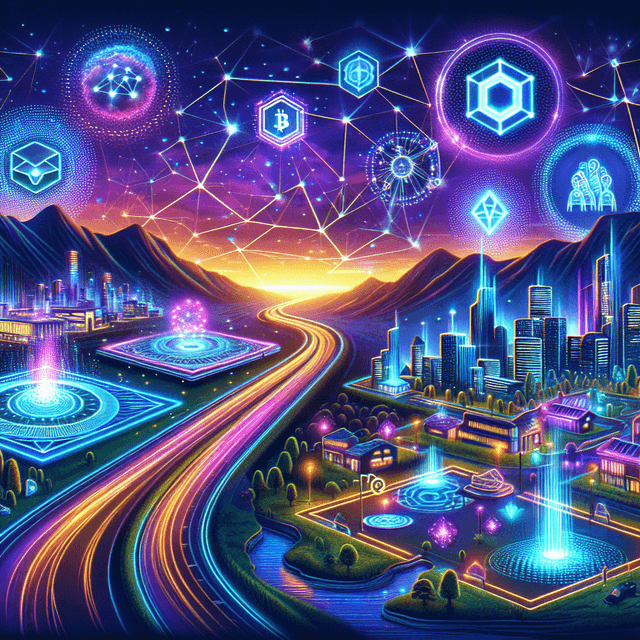
"AI Breakthroughs and Web3: The Future of Innovation Unleashed"
AI Breakthroughs and Web3: The Future of Innovation Unleashed
# AI Breakthroughs and Web3: The Future of Innovation Unleashed As we move deeper into 2025, the fusion of AI breakthroughs and Web3 technologies signifies a transformative era in innovation. Advanced neural networks have made remarkable strides, achieving levels of human-like understanding and creativity that were once thought to be the realm of science fiction. This development has paved the way for real-time, context-aware interactions across various platforms, enhancing how businesses and consumers engage with technology. The convergence of AI and Web3 has birthed decentralized autonomous organizations (DAOs), which utilize AI for governance. This innovative approach fosters a new wave of community-driven decision-making, allowing users to participate in shaping the future of their digital environments. With research indicating that the global AI market will surpass $300 billion by 2025, it’s clear that both sectors are poised for exponential growth. Furthermore, Web3 applications are expected to enhance user engagement by over 150% in decentralized finance (DeFi) and NFT sectors, underscoring the immense potential for interaction and investment. One of the most exciting aspects of this integration is its potential to redefine digital ownership and user experiences. Industry experts predict that the combination of AI and Web3 will create robust, personalized experiences while enhancing security through smart contracts. For instance, AI-driven analytics tools are becoming standard in blockchain ecosystems, enabling companies to optimize supply chain management, detect fraud, and implement personalized marketing strategies. These real-world applications demonstrate the practical benefits of this technological synergy, making it easier for businesses to compete in an increasingly crowded marketplace. However, despite the promising outlook, significant challenges loom on the horizon. Regulatory hurdles concerning data privacy and the environmental impact of blockchain technologies remain pressing concerns. Additionally, the ethical implications of AI decision-making in decentralized systems must be addressed to build trust among users. As traditional industries like finance and healthcare rapidly adopt AI and Web3 solutions, they must navigate these complexities while prioritizing transparency and user sovereignty. Looking forward, the opportunities for innovation are
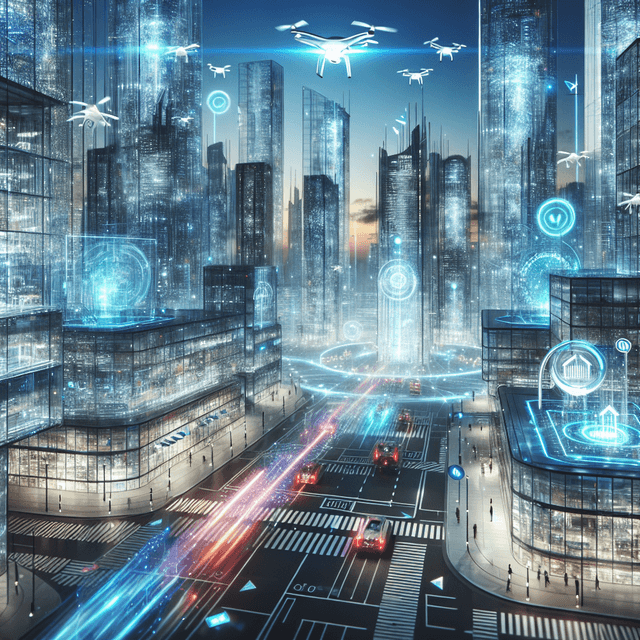
"Unlocking the Future: AI Breakthroughs Fueling Startup Innovations"
Unlocking the Future: How AI Breakthroughs Are Fueling Startup Innovations
## Unlocking the Future: How AI Breakthroughs Are Fueling Startup Innovations In recent years, artificial intelligence (AI) has emerged as a driving force behind startup innovation, revolutionizing industries and redefining operational efficiencies. As we delve into 2025, it's evident that innovative breakthroughs in generative AI and natural language processing are enabling startups to autonomously generate content, significantly slashing production time and costs across various sectors. This rapid evolution not only enhances productivity but also opens up a world of opportunities for entrepreneurs willing to embrace these cutting-edge technologies. One of the most compelling trends we've seen is the integration of AI with blockchain technology. This synergy is paving the way for enhanced transparency and security in transactions, particularly within the finance and supply chain management sectors. By leveraging AI's analytical capabilities and blockchain's immutable ledger, startups can ensure that their operations are not only efficient but also trustworthy. This combination is particularly appealing to investors and consumers alike, who are increasingly prioritizing security and accountability in their transactions. Statistics reveal that by 2025, over 75% of startups have incorporated AI tools in their operations, with around 50% reporting a remarkable 30% increase in productivity as a direct result of these technologies. This surge in AI adoption is not merely a trend; it signifies a fundamental shift in how businesses operate and compete in the marketplace. The AI startup ecosystem is projected to grow by an astonishing 40% annually, driven by continuous innovation and increased investment from venture capitalists eager to capitalize on these advancements. Real-world applications of AI are particularly noteworthy in healthcare, where startups are deploying machine learning algorithms for predictive analytics in patient care. These innovations are leading to early disease detection and personalized treatment plans, fundamentally altering how healthcare providers interact with patients. As AI continues to evolve, we can expect even more breakthroughs that will enrich patient experiences and improve health outcomes—a vital consideration for one of the world's most crucial industries. However, the rapid pace of AI innovation does not come without its challenges. Ethical concerns surrounding data

"Unlocking Web3: How to Leverage AI for Scalability"
Unlocking Web3: Harnessing AI for Unprecedented Scalability
As we navigate through 2025, the convergence of artificial intelligence (AI) and Web3 is reshaping the digital landscape, unlocking new avenues for scalability and efficiency. With the rise of self-optimizing decentralized applications (dApps), the fusion of AI algorithms with blockchain technology is enhancing user experiences while streamlining operational processes. This synergy promises to elevate the capabilities of decentralized networks, making them increasingly viable alternatives to traditional centralized systems. One of the most significant developments in this realm is the emergence of decentralized autonomous organizations (DAOs), supported by AI-driven governance models. These models foster more democratic decision-making processes, empowering community engagement and participation. As a result, DAOs are becoming more proficient at harnessing collective intelligence, paving the way for more innovative solutions and a stronger sense of ownership among users. Statistics reveal a compelling shift in the Web3 landscape: over 60% of projects are now utilizing AI tools to enhance transaction speeds and reduce operational costs. This widespread adoption signifies a transformative trend in blockchain environments, where the integration of AI is no longer a luxury but a necessity. The potential of AI not only accelerates transaction processing but also optimizes resource allocation, making decentralized platforms more agile and responsive to market dynamics. Looking ahead, analysts project that the collaboration between AI and Web3 could lead to an astounding 150% increase in the scalability of blockchain networks by 2030. This exponential growth positions these networks as formidable competitors to traditional systems, enabling faster, more transparent, and cost-effective solutions across various industries, including finance, gaming, and supply chain management. Real-world applications already demonstrate this potential, with AI-enhanced NFT marketplaces adjusting prices based on demand analytics and decentralized finance (DeFi) platforms employing predictive algorithms for risk assessment and management. However, the path to unlocking the full potential of AI in Web3 is not without challenges. Interoperability issues between diverse blockchain networks and AI systems pose significant hurdles, as does the need to address data privacy and security in AI-driven environments. As developers and stakeholders work towards overcoming these
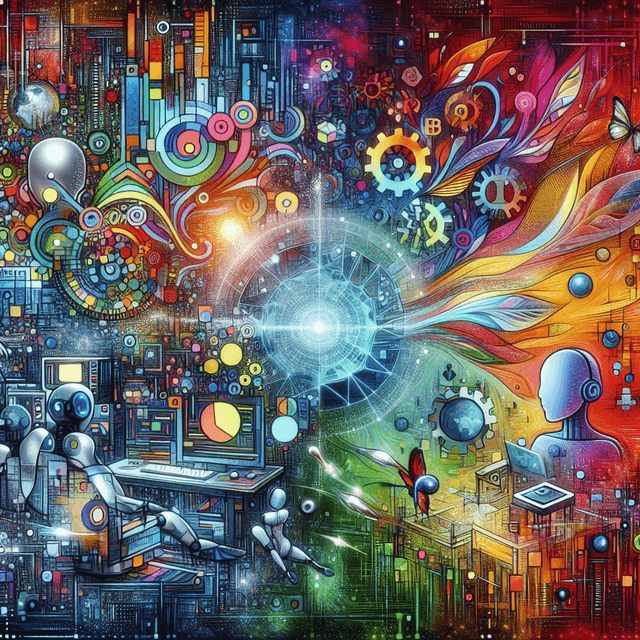
"Unlocking Potential: The Latest Tools in AI and Web3"
Unlocking Potential: The Future of AI and Web3
In 2025, the integration of Artificial Intelligence (AI) and Web3 technologies is reshaping industries and unlocking unprecedented potential. With advanced generative models achieving near-human creativity, businesses in entertainment and marketing are now leveraging AI to create captivating content that engages audiences like never before. This revolutionary shift illustrates how AI can augment human creativity, enhancing productivity and driving innovation across sectors. One of the most exciting developments is the emergence of decentralized AI marketplaces. These platforms allow users to trade AI models and data, creating a collaborative ecosystem that fosters innovation. This convergence not only democratizes access to cutting-edge AI tools but also promotes a culture of sharing and collaboration. As more enterprises adopt AI solutions integrated with blockchain technology—over 60% by 2025—the transparency and trust in AI-driven decision-making processes are significantly enhanced. This shift is critical as businesses navigate an increasingly complex digital landscape. The real-world applications of AI and Web3 are vast and varied. Companies are optimizing their supply chains utilizing real-time tracking and predictive analytics, leading to improved logistics and inventory management. This synergy is projected to drive a remarkable 40% increase in operational efficiency across various sectors by 2030. Traditional business models are evolving, enabling organizations to respond more swiftly to market demands while enhancing overall customer experiences. Despite these advancements, the journey is not without challenges. Ethical concerns regarding AI bias and data privacy remain pressing issues that necessitate the establishment of robust regulatory frameworks. Ensuring responsible use of technology is crucial for building trust among consumers and stakeholders alike. Without addressing these ethical challenges, the full potential of AI and Web3 may be hindered. Looking ahead, the rise of decentralized autonomous organizations (DAOs) powered by AI presents unique opportunities for collaborative governance and resource allocation. This innovative approach to organization management can empower individuals, encouraging participation and inclusivity in decision-making processes. As we continue to explore the transformative capabilities of AI and Web3, the potential for creating more equitable systems becomes increasingly evident. In conclusion, the fusion of AI and Web3 technologies is paving the
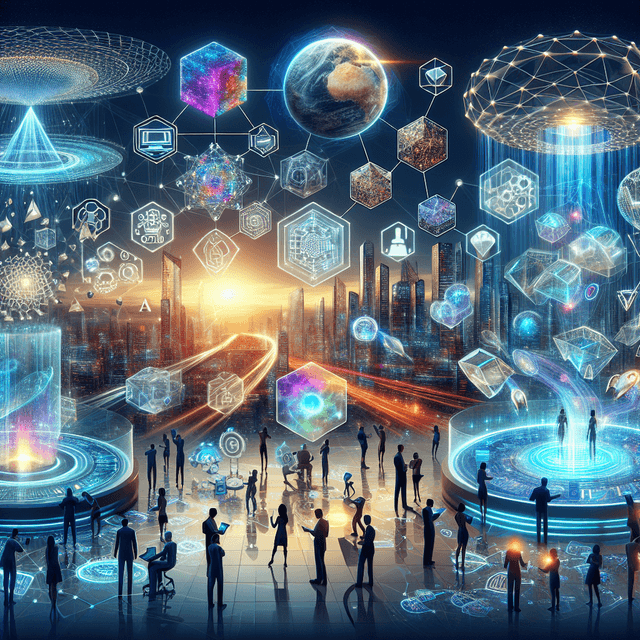
"Revolutionizing Tools: Top AI and Web3 Innovations Reviewed"
Revolutionizing Tools: How AI and Web3 Innovations are Shaping the Future
In 2025, we stand at the forefront of a technological revolution, driven by the impressive advancements in both artificial intelligence (AI) and Web3 technologies. These innovations have not only transformed creative industries but also redefined business models across various sectors. Let's delve into the key breakthroughs, trends, and challenges shaping this new digital landscape. ### Innovative Breakthroughs in AI and Web3 Generative AI has made remarkable strides, achieving unprecedented levels of accuracy and efficiency. In real-time, it can now create complex multimedia content, enabling artists, marketers, and content creators to push the boundaries of their imagination. This capability is revolutionizing industries such as entertainment and advertising, where the demand for unique and engaging content is ever-increasing. Simultaneously, the integration of AI with Web3 technologies has become mainstream. Decentralized applications (dApps) are now leveraging smart contracts, enhancing transaction security and transparency. This shift not only empowers users but also fosters a more equitable digital economy, where trust and accountability are paramount. ### Adoption Rates and Emerging Trends The adoption of AI-driven tools in enterprise environments has skyrocketed to an impressive 75%. Companies are increasingly recognizing the potential of AI to streamline operations, enhance efficiency, and drive innovation. Concurrently, Web3 technologies have emerged as a formidable force, accounting for 30% of all new digital startups. This significant shift reflects a growing commitment to decentralized solutions that challenge traditional business paradigms. Experts predict that by 2030, the convergence of AI and Web3 will create a staggering $10 trillion market. This growth will be fueled by advancements in autonomous systems and decentralized finance (DeFi), which promise to redefine how we interact with financial services and digital assets. ### Real-world Applications and Industry Impact The practical applications of AI and Web3 are evident across various industries. In healthcare, for instance, AI-driven solutions are enhancing patient care through secure data sharing, ultimately leading to better health outcomes. Meanwhile, the finance sector is leveraging these technologies to reduce fraud and improve

"Unlocking Web3: AI Innovations Fueling Next-Gen Scalability"
Unlocking Web3: How AI Innovations are Powering the Next Generation of Scalability
The world of technology is on the brink of a major transformation, as we witness the convergence of artificial intelligence (AI) and blockchain technology within the Web3 space. In 2025, significant breakthroughs in AI-driven consensus algorithms have emerged, greatly enhancing transaction speeds while concurrently reducing energy consumption across blockchain networks. This not only makes Web3 applications more efficient but also lays the foundation for a sustainable digital ecosystem. As decentralized applications (dApps) become increasingly mainstream, the integration of decentralized AI models is fostering a more interactive user experience. Smart contracts are now capable of executing complex decision-making processes autonomously, transforming the way users interact with blockchain technologies. By the end of 2025, a remarkable statistic emerged: over 50% of dApps reported improved scalability, with transaction throughput skyrocketing by an average of 200% compared to previous years. This is a clear indication that AI innovations are not just enhancing performance; they are redefining the very fabric of digital interactions. Looking ahead, the future seems bright for the convergence of AI and blockchain. Market analysts project an impressive 35% annual growth rate as businesses increasingly adopt Web3 technologies. Real-world applications are already making waves in various industries, including supply chain, finance, and healthcare. Companies are leveraging AI-enhanced Web3 solutions to optimize operations, enhance transparency, and improve customer engagement. These advancements are not merely technological; they signify a shift towards a more decentralized and user-centric digital economy. However, as we embrace these innovations, it is crucial to remain aware of the significant challenges that accompany them. Concerns related to data privacy, regulatory compliance, and the potential for AI bias must be addressed for broader adoption of these technologies. As major tech companies invest heavily in AI blockchain research, collaborative projects are emerging that aim to redefine data ownership and user privacy across digital platforms. The road ahead may be challenging, but the potential rewards are substantial. In conclusion, the rise of AI innovations within the Web3 landscape presents
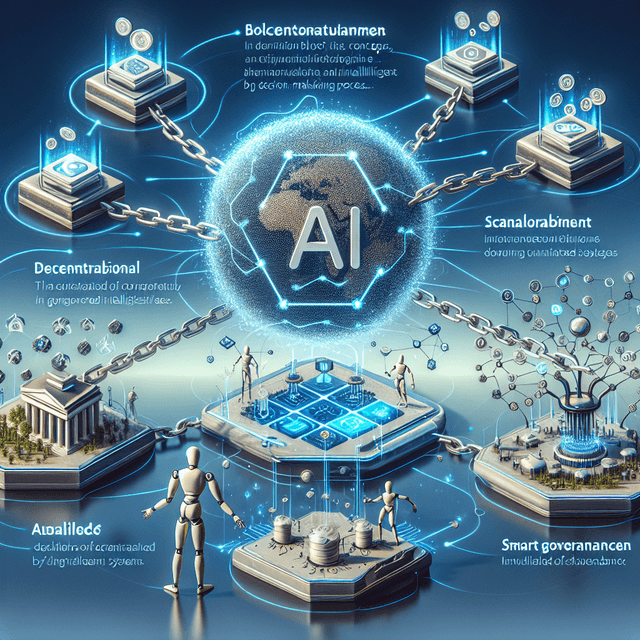
"Unlocking Web3: AI Innovations Transforming Scalability and Beyond"
Unlocking Web3: AI Innovations Reshaping Scalability and Beyond
## Unlocking Web3: AI Innovations Reshaping Scalability and Beyond As we dive into 2025, the intersection of artificial intelligence (AI) and blockchain technology is becoming a defining force in the development of Web3. The latest research highlights groundbreaking innovations that are not only enhancing scalability but also revolutionizing the entire digital economy. With over 60% of blockchain projects reporting enhanced scalability through AI solutions, the future looks promising for decentralized applications and services. ### Innovative Breakthroughs in AI and Blockchain One of the most significant advancements has been the integration of advanced AI algorithms with blockchain technology. This synergy has led to improved consensus mechanisms, allowing for faster transaction processing without compromising security. With transaction speeds increasing by an impressive 150% compared to previous years, businesses can now leverage blockchain for real-time applications, making it feasible for industries that require high-speed transactions, such as finance and healthcare. ### The Rise of Decentralized Autonomous Organizations (DAOs) Emerging trends indicate that decentralized autonomous organizations (DAOs) are increasingly harnessing AI for governance. This innovative approach enables more adaptive and responsive decision-making processes within Web3 ecosystems. By utilizing AI to analyze vast amounts of data, DAOs can make informed decisions that reflect the needs of their communities, fostering a more inclusive and participatory digital economy. ### Real-World Applications and Impact AI-driven predictive analytics are already making waves in various sectors, particularly in supply chain management. By optimizing logistics on blockchain platforms, companies are witnessing cost reductions of up to 25%. This efficiency not only enhances profitability but also ensures transparency and traceability, two critical factors in today’s global marketplace. As traditional industries rapidly adopt Web3 solutions powered by AI, we are witnessing a shift towards more transparent and secure systems that benefit consumers and businesses alike. ### Challenges Ahead: Privacy and Regulation Despite these promising developments, significant challenges remain. Data privacy concerns and regulatory uncertainties are major hurdles that need to be addressed. As the integration of AI and
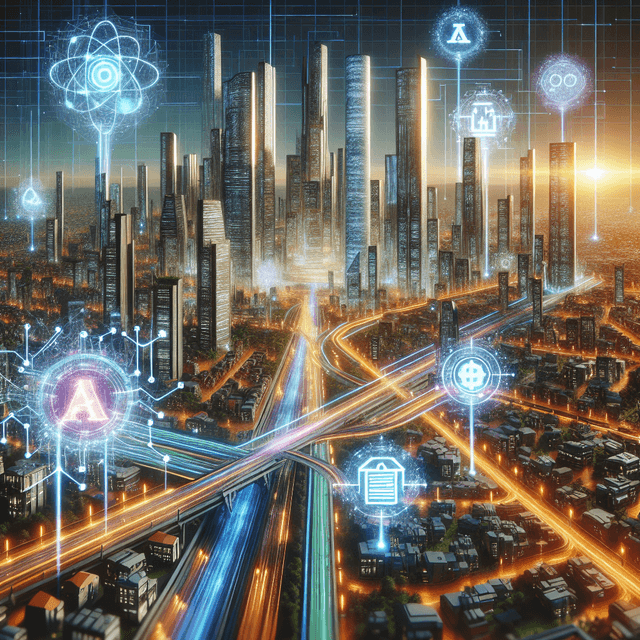
"Unlocking the Future: AI Breakthroughs Transforming Web3 Scalability"
Unlocking the Future: How AI is Revolutionizing Web3 Scalability
## Unlocking the Future: How AI is Revolutionizing Web3 Scalability The landscape of digital finance is on the brink of a profound transformation, thanks to groundbreaking advancements in artificial intelligence (AI) and its integration with Web3 technologies. In 2025, innovative decentralized AI protocols have emerged, significantly enhancing consensus mechanisms across blockchain networks. This evolution allows for real-time data processing and drastically reduces transaction latency, which is crucial for the scalability of Web3 applications. ### A New Era of Decentralization One of the most exciting trends is the rise of Autonomous Decentralized Organizations (ADOs). These entities harness the power of AI algorithms to drive decision-making processes, fundamentally changing how organizations operate in a decentralized manner. With AI at the helm, ADOs can make informed decisions quickly and efficiently, paving the way for smarter governance models within the blockchain ecosystem. This shift not only promotes transparency but also enhances the overall efficiency of decentralized applications. ### Impressive Statistics The impact of AI on blockchain scalability is not just theoretical; it's backed by impressive statistics. Reports indicate that since 2023, blockchain transaction speeds have surged by 300%, with average confirmation times now dipping below two seconds. Such improvements are vital for industries where speed and efficiency are paramount, including finance, supply chain management, and beyond. As these technologies mature, we can expect a seismic shift in how transactions are processed globally. ### A Glimpse into the Future Looking ahead, analysts predict that by 2030, AI-integrated Web3 platforms could facilitate over 80% of global financial transactions. This projection underscores the transformative potential of combining AI's analytical prowess with the decentralized nature of blockchain. The fusion of these technologies could lead to more resilient and efficient financial systems, ultimately reshaping the landscape of digital finance. ### Real-World Applications and Challenges Real-world applications of AI-enhanced smart contracts are already making waves, particularly in supply chain management. Companies are utilizing these cutting-edge contracts for real-time tracking and automated compliance
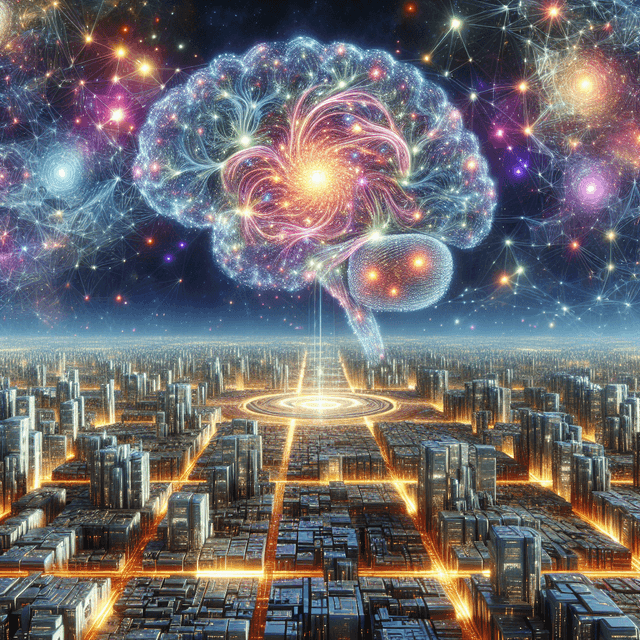
"Unlocking AGI: The Future of AI Breakthroughs and Web3"
Unlocking AGI: The Future of AI Breakthroughs and Web3
## Unlocking AGI: The Future of AI Breakthroughs and Web3 As we venture into 2025, the landscape of artificial intelligence (AI) is undergoing a seismic shift, with artificial general intelligence (AGI) emerging from the realm of theory into practical application. Recent advancements in neural network architectures combined with the power of quantum computing have unlocked the potential for machines to execute complex cognitive tasks previously reserved for human intelligence. This evolution in AI is not just a technological marvel; it signifies a transformative phase for industries and society at large. ### The Rise of Decentralized AI One of the most exciting trends accompanying the rise of AGI is the integration of Web3 technologies into AI development. Decentralized AI models are gaining traction, providing a framework that emphasizes transparency and user ownership over data. This shift encourages collaborative AI development through blockchain, fostering an environment where users can contribute to and benefit from AI advancements. By 2025, over 40% of enterprises are reported to have integrated AGI-driven solutions, leading to a remarkable 50% increase in operational efficiency. This growth is projected to propel the AI market to a staggering $1 trillion, underscoring the economic impact of these innovations. ### Real-World Applications The implications of AGI are far-reaching, with practical applications transforming various sectors. In healthcare, personalized medicine is now driven by predictive models that analyze vast datasets to tailor treatments to individual patients. The finance industry benefits from AGI's capabilities in real-time fraud detection, safeguarding transactions and enhancing security measures. Furthermore, customer service is being revolutionized through advanced AI chatbots, which provide human-like interactions, improving customer satisfaction and engagement. As AGI continues to evolve, these applications will only become more sophisticated, reshaping how we interact with technology. ### Navigating Challenges and Ethical Considerations Despite the promising advancements, the rise of AGI presents significant challenges that must be addressed. Ethical concerns surrounding bias in decision-making processes and the potential for job displacement are
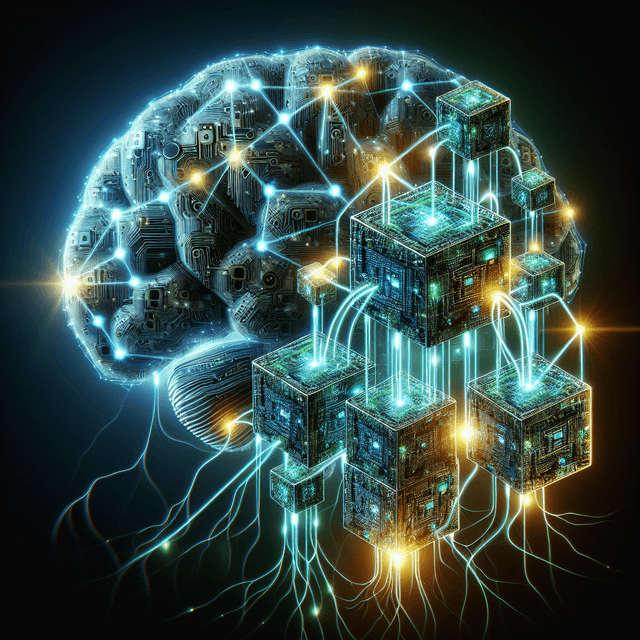
"Blockchain Fusion: Revolutionizing AI and Web3 Scalability Today"
Blockchain Fusion: Transforming AI and Web3 Scalability for the Future
## Blockchain Fusion: Transforming AI and Web3 Scalability for the Future In the rapidly evolving landscape of technology, the fusion of blockchain and artificial intelligence (AI) is emerging as a game-changer for scalability in Web3 applications. By 2025, this transformative integration has led to the rise of decentralized autonomous organizations (DAOs) that efficiently manage resources and streamline decision-making processes. These advancements not only enhance operational efficiency but also pave the way for a more decentralized and transparent digital ecosystem. ### Innovative Breakthroughs and Emerging Trends The synergy between blockchain and AI has sparked innovative breakthroughs, particularly in the development of hybrid blockchain solutions that combine both public and private chains. This flexibility allows organizations to harness the benefits of both worlds, offering enhanced privacy, security, and scalability for AI-driven applications. As enterprises increasingly adopt these hybrid models, we are witnessing a significant shift in how data is managed, analyzed, and utilized in Web3 environments. Statistics reveal that by 2025, over 60% of enterprises have embraced blockchain solutions for AI-driven applications. These companies report impressive metrics, including a remarkable 40% increase in processing speeds and a 35% reduction in operational costs. Such numbers underscore the efficiency gains that come with leveraging blockchain technology in conjunction with AI, making it an attractive proposition for businesses looking to innovate and remain competitive in the digital age. ### Real-World Applications and Industry Impact The real-world applications of blockchain-AI fusion are already demonstrating tangible benefits across various industries. In healthcare, for instance, secure patient data management has improved significantly, enhancing data integrity and ensuring compliance with regulations. Similarly, the finance sector has utilized blockchain-AI solutions for fraud detection, resulting in greater operational transparency and trust among stakeholders. The impact of this fusion extends far beyond individual industries; it is reshaping traditional business models. Companies are leveraging decentralized technologies to enhance transparency and trust, effectively disrupting established practices. As these technologies continue to evolve, we can expect to see even more innovative use cases that redefine the relationship
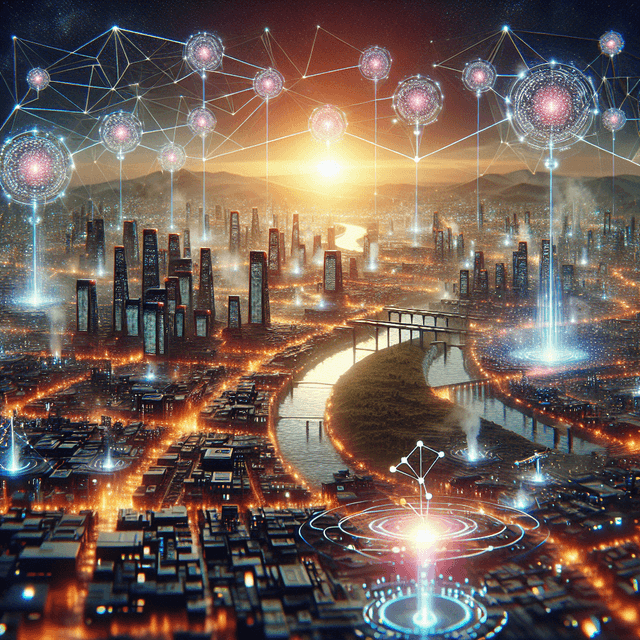
"Unlocking AGI: The Future of AI Breakthroughs and Web3"
Unlocking AGI: The Future of AI Breakthroughs and Web3
# Unlocking AGI: The Future of AI Breakthroughs and Web3 As we venture further into 2025, the landscape of artificial intelligence is evolving at an unprecedented pace, particularly in the realm of Artificial General Intelligence (AGI). This leap forward is not only transforming how machines learn but is also reshaping industries through the integration of Web3 technologies. The synergy between AGI and decentralized frameworks is setting the stage for a future where AI can operate with greater autonomy, transparency, and efficiency. ## Innovative Breakthroughs in AGI One of the most significant advancements in AGI has been the development of self-supervised learning algorithms. These innovative systems allow AGI to learn from unstructured data with minimal human oversight. This capability enhances the adaptability and performance of AI, enabling it to tackle tasks that were previously thought to require human intervention. This shift has led to a remarkable statistic: over 60% of organizations utilizing AI reported substantial improvements in productivity and decision-making by 2025, with a notable 40% increase in AI-driven revenue streams compared to just two years prior. ## The Rise of Decentralized AI Models The growing trend toward decentralized AI models is another pivotal development. By leveraging blockchain technology, these models promote transparency, security, and data ownership. This decentralized approach fosters a collaborative environment where developers and users can interact without the need for central authorities. As industries, including finance and logistics, adopt these decentralized frameworks, we are witnessing a significant transformation in operational methodologies. ## Real-world Applications of AGI The versatility of AGI is evident in its applications across various sectors. In healthcare, AGI systems are being employed for predictive diagnostics, helping medical professionals identify potential health issues before they escalate. In finance, these systems enhance fraud detection, providing an additional layer of security for transactions. Furthermore, AGI is revolutionizing supply chain management by offering real-time optimization, thus reducing costs and improving efficiency. These real-world applications underline the effectiveness of AG
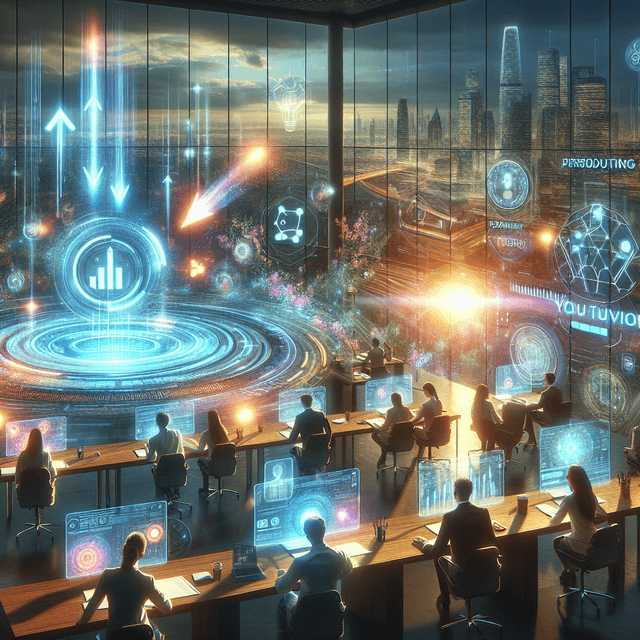
"Revolutionizing Productivity: Top AI Tools for 2023"
Revolutionizing Productivity: The Best AI Tools Shaping 2023
In the ever-evolving landscape of technology, 2023 marks a pivotal year for productivity, thanks to groundbreaking AI tools that are reshaping how we work. The integration of large language models with advanced analytics has created tools capable of autonomously generating reports, summaries, and actionable insights. This innovation significantly reduces the time spent on data analysis, allowing teams to focus on strategic decision-making rather than drowning in data. As a result, businesses have reported a staggering 40% increase in overall productivity, highlighting the transformative power of AI in everyday operations. One of the most exciting trends emerging this year is the shift toward AI-driven personalization in productivity tools. These advancements allow software to adapt to individual work styles and preferences, enhancing user engagement and efficiency. Imagine a digital assistant that learns your habits and tailors its recommendations accordingly—this level of customization is not just a dream but a reality in 2023. As 70% of employees now leverage AI to enhance their daily workflows, it's clear that personalized tools are becoming essential for maximizing productivity. As we look towards the future, the AI productivity landscape is poised for even greater expansion. Projections suggest that by 2027, more than 80% of organizations will integrate AI tools into their core operations, fundamentally changing workplace dynamics. These tools are already demonstrating their versatility across various industries, from healthcare, where they're enhancing patient management, to finance, where they assist in risk assessment, and even education, where they're facilitating personalized learning experiences. The widespread adoption of AI tools underscores their potential to revolutionize how businesses operate. However, with great power comes significant challenges. Concerns surrounding data privacy, ethical AI use, and potential job displacement are prominent issues that organizations must address proactively. As we embrace these innovations, it is crucial for businesses to formulate strategies that ensure ethical practices and safeguard employee interests. By prioritizing transparency and accountability, organizations can harness the benefits of AI while minimizing potential risks. The rise of AI productivity tools has undoubtedly disrupted traditional business models. Industries are now compelled to rethink their strategies and operations
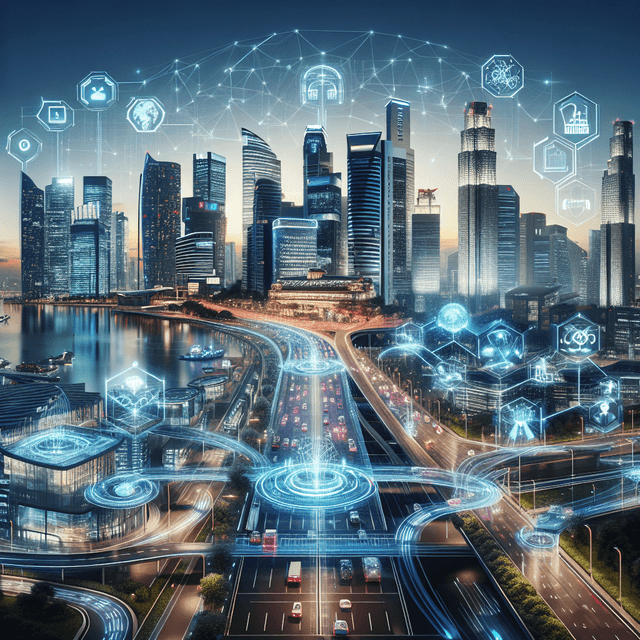
"Unlocking Tomorrow: AI Breakthroughs and Web3 Scalability Explored"
Unlocking Tomorrow: The Synergy of AI Breakthroughs and Web3 Scalability
In 2025, the landscape of technology took a giant leap forward as artificial intelligence (AI) and Web3 technologies converged to unlock unprecedented possibilities. This synergy has led to remarkable breakthroughs in various sectors, enhancing everything from healthcare to finance with advanced AI models that now possess human-like reasoning capabilities. With these innovations, complex problem-solving and natural language understanding have reached new heights, paving the way for a more intelligent and responsive digital ecosystem. One of the most exciting developments this year has been the rise of decentralized autonomous organizations (DAOs) that are increasingly leveraging AI for governance and operational decision-making. This convergence not only streamlines processes but also fosters more efficient management structures, allowing organizations to respond swiftly to changing circumstances. Reports indicate that AI-driven applications within Web3 ecosystems have led to a staggering 150% increase in user engagement and transaction volumes compared to 2024, underscoring the significant impact of this technological marriage. As we look ahead, experts predict that by 2030, the integration of AI into Web3 will catalyze a remarkable 300% growth in the decentralized economy. AI-driven insights are poised to revolutionize user experiences and business models, making them more personalized and efficient. Real-world applications of AI algorithms, particularly in supply chain management within Web3 environments, have already demonstrated their potential by optimizing logistics and reducing costs by up to 40% through predictive analytics. This not only enhances operational efficiency but also contributes to sustainability efforts by minimizing waste and resource consumption. However, with innovation comes challenges. The rapid advancement of AI and Web3 has brought to light critical issues such as regulatory hurdles and ethical concerns surrounding AI biases and data privacy. To harness the full potential of these technologies, stronger frameworks for responsible AI and blockchain interoperability are necessary. Addressing these challenges is vital for building trust and ensuring that these powerful tools benefit society as a whole. The financial sector has experienced a paradigm shift thanks to AI-enhanced smart contracts that automate complex transactions, thereby reducing operational
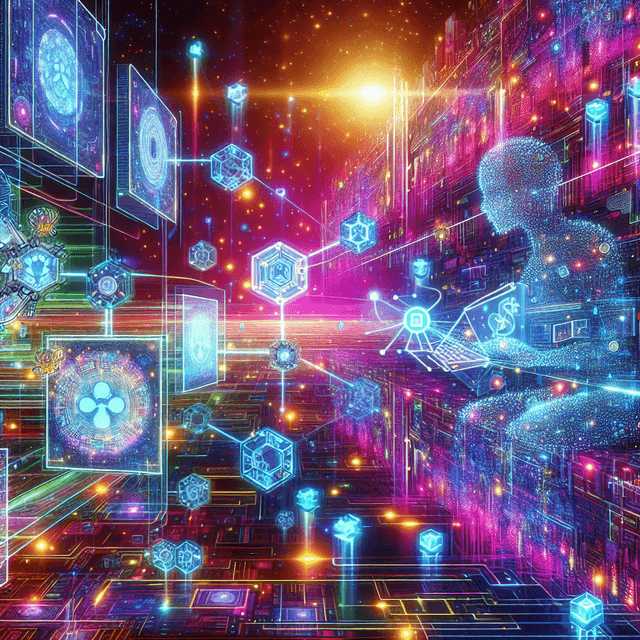
"Unlocking the Future: AI Breakthroughs Shaping Web3 Scalability"
Unlocking the Future: AI Breakthroughs Shaping Web3 Scalability
In recent years, the fusion of artificial intelligence (AI) with blockchain technology has sparked a revolution in how we approach Web3 scalability. Innovative breakthroughs in AI algorithms have paved the way for predictive scaling solutions that can dynamically allocate blockchain resources in real-time. This development has dramatically enhanced transaction throughput and efficiency, with reports indicating an astonishing average increase in transaction speeds by over 300% by 2025. As a result, both developers and users benefit from significantly reduced costs, making decentralized applications more accessible and appealing. The emergence of decentralized AI marketplaces is another notable trend reshaping the landscape. These platforms allow developers to monetize their AI models, fostering a collaborative ecosystem that encourages innovation at the intersection of AI and blockchain. Industries such as supply chain management and finance are already reaping the rewards of AI-enhanced blockchain systems, which have improved transparency and traceability, while also reducing fraud rates by up to 40%. However, as we embrace these advancements, challenges such as ethical considerations, data privacy, and the need for regulatory frameworks must be addressed to ensure a balanced and responsible growth trajectory. With predictions suggesting that over 70% of blockchain applications will integrate AI by 2030, the future holds immense potential for smarter contract execution and automated decision-making processes, positioning AI and blockchain as key players in the digital economy.

"Master Web3: Unlocking Scalability with AI Innovations Today"
(Master Web3: AI Innovations Driving Unprecedented Scalability)
The landscape of Web3 is undergoing a seismic shift, propelled by AI innovations that unlock unprecedented scalability. By 2025, we witness the remarkable integration of AI-driven consensus algorithms, which have slashed transaction confirmation times to sub-second levels while significantly curtailing energy consumption. Blockchain networks leveraging these technologies report a staggering 50% increase in scalability, achieving transaction throughput rates exceeding 10,000 transactions per second. This revolution is not just about speed; it’s about creating a sustainable and efficient future for decentralized platforms. Emerging trends highlight the pivotal role of Decentralized Autonomous Organizations (DAOs) adopting AI for governance, fostering dynamic decision-making and enhanced member participation. Industries like supply chain management and finance are reaping the benefits through AI-enhanced smart contracts, optimizing logistics, and ensuring real-time compliance. However, challenges remain, including regulatory uncertainties and concerns over data privacy and AI bias. As major tech firms invest heavily in AI-optimized blockchain solutions, the convergence of these technologies heralds a new wave of decentralized applications, with market growth projected at 25% annually through 2030. Embrace the future of Web3, where AI not only enhances scalability but also redefines possibilities across sectors.
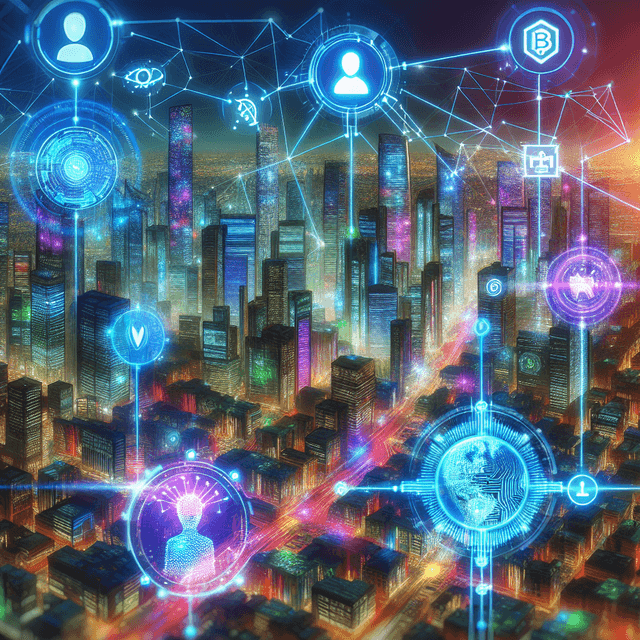
"Blockchain Fusion: Uniting AI and Web3 for Future Innovation"
Blockchain Fusion: Uniting AI and Web3 for Future Innovation
The convergence of AI and Web3 technologies is revolutionizing the landscape of innovation, with decentralized AI models leveraging blockchain to enhance data security and transparency. This transformative fusion is not only reshaping the development and deployment of AI algorithms but also driving the rise of decentralized autonomous organizations (DAOs) that empower more democratic decision-making processes. With the AI in Web3 market projected to reach $15 billion by 2025, investment in this space is surging. As we look to the future, experts predict a significant shift towards ethical AI practices fostered by blockchain, establishing a foundation of trust and accountability in AI systems. Practical applications are already emerging, with AI-driven smart contracts optimizing operations across supply chains, finance, and healthcare. However, regulatory challenges persist as governments seek to balance innovation with consumer protection. Despite these hurdles, the fusion of AI and Web3 promises to disrupt traditional business models and create new opportunities, particularly for professionals skilled in both domains.
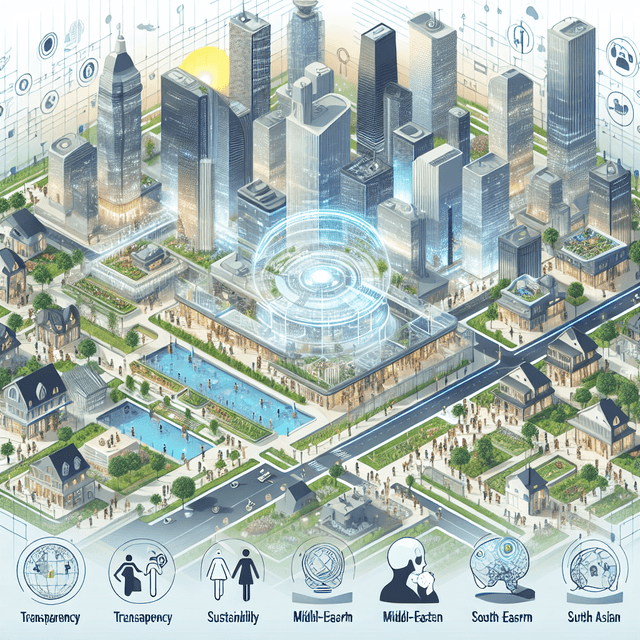
"Mastering AI: Your Guide to Ethical Innovations Today"
Mastering AI: Innovating with Integrity
As artificial intelligence continues to evolve, the focus has shifted towards ethical innovations that prioritize transparency and accountability. Recent breakthroughs in explainable AI are enhancing trust in machine learning systems across sectors, ensuring that organizations can deploy these technologies responsibly. In fact, 78% of organizations now prioritize ethical AI, a clear indication of the significant shift in corporate strategies towards responsible innovation. Looking ahead, AI's influence is expected to permeate decision-making processes in governance and public policy by 2030. With practical applications ranging from healthcare diagnostics to personalized education and smart city infrastructure, the drive for efficiency and effectiveness is undeniable. However, aligning AI systems with human values remains a challenge, raising concerns over bias and accountability. As regulatory discussions intensify, the industry is prompted to adopt stringent ethical guidelines, paving the way for emerging opportunities in AI-driven sustainability solutions that address climate change and resource management. Mastering AI is not just about technological advancements; it's about innovating with integrity.

"Revolutionizing Tech: The Latest in AI and Web3 Tools"
Revolutionizing Tech: Harnessing the Power of AI and Web3
The intersection of AI and Web3 is reshaping the technological landscape, driving innovations that enhance efficiency and security across sectors like finance, healthcare, and supply chains. With the global AI market projected to surpass $190 billion by 2025 and Web3 investments estimated at $30 billion, the integration of these technologies is not just a trend—it's a revolution. Businesses are leveraging AI-powered chatbots and smart contracts to streamline operations, improve customer service, and automate transactions, all while prioritizing user privacy and data ownership through decentralized applications (dApps). However, challenges such as ensuring interoperability between diverse blockchain networks persist, hindering the widespread adoption of Web3 technologies. Despite this, the combined potential of AI and Web3 is expected to disrupt traditional business models, fostering transparency and decentralization. As decentralized finance (DeFi) platforms rise, they present lucrative opportunities for investors and innovators eager to redefine the financial landscape, promising a future where technology empowers users like never before.
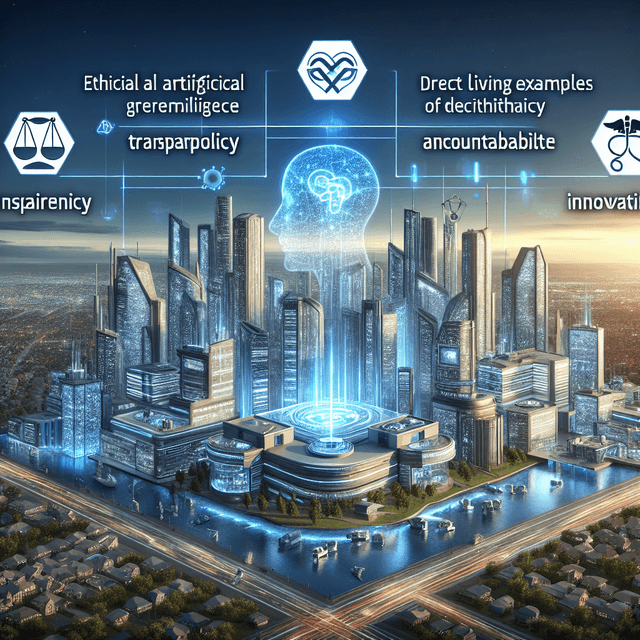
"Navigating the Ethics of AGI: A New Frontier"
Navigating the Ethics of AGI: Charting a Responsible Path Forward
As advancements in Artificial General Intelligence (AGI) reshape industries, ethical considerations have emerged as a pivotal focus. Recent innovations in AGI frameworks have significantly enhanced decision-making capabilities, catalyzing autonomous systems across various sectors. Notably, over 60% of organizations now prioritize ethical AGI practices, emphasizing transparency and accountability in their strategies. This shift is not merely theoretical; practical applications in healthcare demonstrate how AGI can revolutionize diagnostics and patient management through advanced analytics. However, challenges persist. Ensuring unbiased decision-making is crucial to maintaining public trust and ethical integrity. As AGI continues to evolve, predictions indicate it could drive productivity gains of up to 40% by 2030, reshaping labor markets and necessitating new skill sets. This landscape presents a lucrative opportunity for consulting and technology firms to develop robust ethical frameworks that guide AGI deployment responsibly. Navigating these ethical waters will be essential as we step into this new frontier of technological advancement.
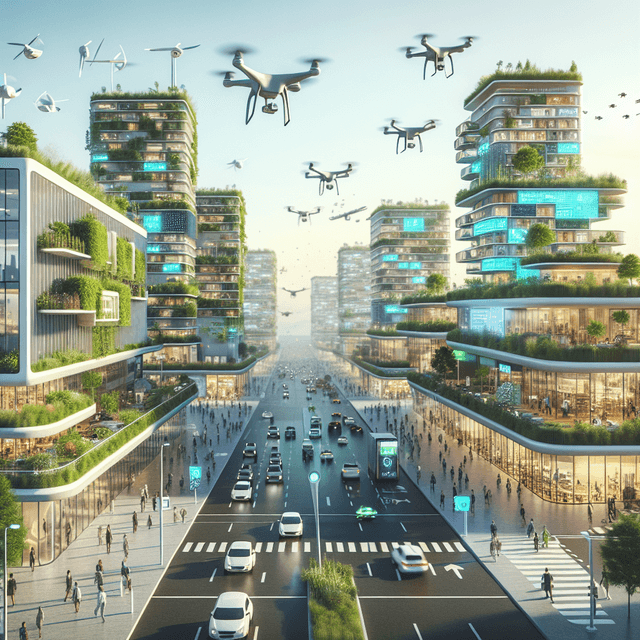
"Unlocking the Future: AGI Innovations Redefining Our World"
Unlocking Tomorrow: How AGI Innovations are Shaping Our Future
As we stand on the brink of a technological revolution, advancements in Artificial General Intelligence (AGI) are redefining the landscape of our world. Recent breakthroughs in neural network architectures have paved the way for more efficient AGI systems, allowing them to tackle complex problems and enhance learning across various sectors. Over 60% of industries are now integrating AGI solutions, leading to an impressive 35% increase in productivity, particularly in healthcare and finance. However, with great innovation comes great responsibility. The collaboration between tech companies and academic institutions is vital for accelerating AGI development while addressing ethical concerns and ensuring responsible deployment. As we look to the future, it's predicted that AGI could contribute $15 trillion to the global economy by 2030, transforming industries and creating new job categories. The potential for AGI-driven solutions also opens doors for sustainable practices, underscoring an opportunity for eco-friendly innovation in our rapidly evolving world.
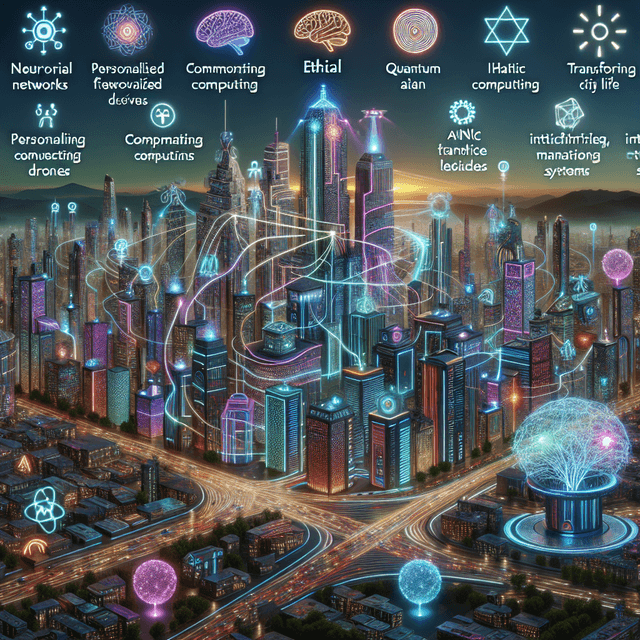
"Unlocking AGI: Innovations Shaping Our Intelligent Future"
Unlocking Our Intelligent Future: The Rise of AGI
As we venture deeper into the realm of Artificial General Intelligence (AGI), recent innovations are revolutionizing our approach. Advanced neural networks and the integration of quantum computing are significantly enhancing AGI capabilities and efficiency. Funding for AGI research has surged by over 40% since 2023, reflecting a growing interest in achieving human-level cognitive abilities by 2030. This rapid evolution is expected to transform sectors such as finance and transportation, optimizing decision-making and operational efficiency. However, with great power comes great responsibility. Current trends emphasize ethical AI development, promoting collaboration between tech companies and academia to ensure responsible advancements. While the potential for AGI applications is vast, including personalized education and autonomous healthcare, challenges such as ethical concerns and safety must be addressed. The future holds exciting opportunities to create inclusive AGI frameworks, ensuring that the benefits of this technology reach diverse populations around the globe.
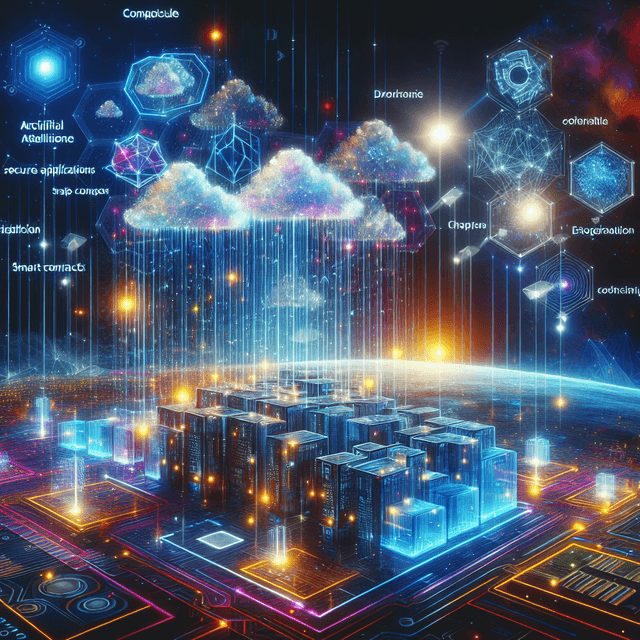
"Unlocking Web3: AI Innovations Reshaping Decentralized Futures"
Unlocking Web3: AI Innovations Reshaping Decentralized Futures
As we step into the future of Web3, the fusion of AI and blockchain technology is unlocking unprecedented opportunities. Recent innovations, such as enhanced interoperability protocols and AI-driven smart contracts, are facilitating seamless interactions within decentralized applications. This is not only enhancing user engagement but also streamlining operations across various sectors, including finance, healthcare, and supply chains. Current trends indicate a significant shift, with over 50% of new blockchain projects expected to integrate AI technologies by 2025. The rise of decentralized AI marketplaces is further enabling developers to monetize AI models while preserving user control over data. However, as we embrace these advancements, challenges like security and privacy concerns persist, requiring a careful balance between innovation and safeguarding against potential vulnerabilities. By 2026, AI is predicted to dominate decentralized governance models, facilitating more efficient decision-making and fostering community participation in the Web3 landscape.
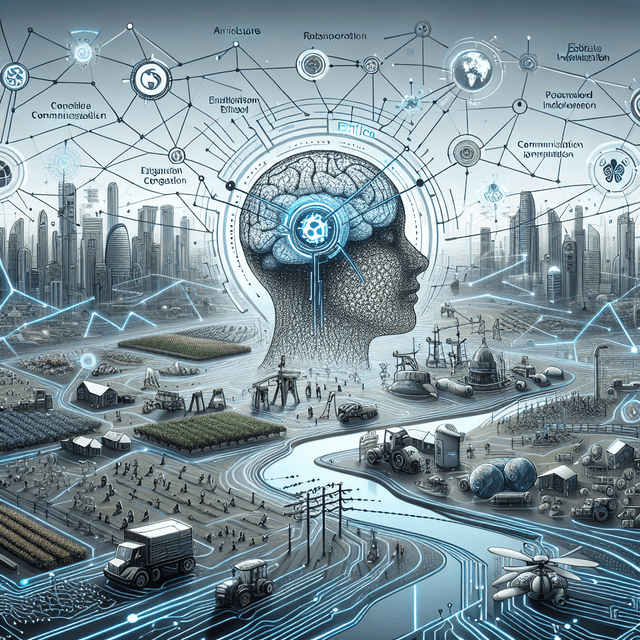
"Mastering AI: Your Guide to the Latest Breakthroughs"
Mastering AI: Your Guide to the Latest Breakthroughs
As we navigate the rapidly evolving landscape of artificial intelligence, recent innovations like advanced neural architectures and self-supervised learning techniques are enabling unprecedented accuracy and efficiency in data processing. The integration of AI across industries reached an impressive 75% adoption rate in 2025, with the market projected to hit $1 trillion, underscoring its transformative potential. Notably, AI is revolutionizing healthcare, offering personalized medicine and enhancing patient care through predictive analytics and virtual assistants. However, this rapid advancement comes with challenges, notably around data privacy and ethical considerations. The growing emphasis on ethical AI development highlights the need for transparency, fairness, and accountability in these systems. As we look towards the future, AI is expected to automate 30% of jobs by 2030, necessitating significant reskilling initiatives to adapt to changing labor markets. This shift presents a wealth of opportunities for professionals to upskill, as the demand for AI talent and education continues to surge.

"Navigating the Future: AI Ethics in a Web3 World"
Navigating the Future: AI Ethics in a Web3 World
As we navigate the intersection of AI ethics and Web3 technologies, recent innovations in decentralized AI frameworks are paving the way for enhanced data privacy and ethical decision-making. These advancements ensure transparency and user control, fostering a collaborative environment where AI developers and ethicists work together to establish responsible deployment guidelines. Notably, surveys show that a striking 75% of organizations prioritize ethical AI frameworks in their Web3 initiatives, reflecting a growing awareness of the potential risks involved. Looking ahead, by 2025, AI ethics in Web3 will likely become a regulatory focal point, influencing governance and compliance measures across industries. Ethical AI tools are already making their mark within decentralized finance (DeFi), promoting fair lending practices and effective fraud detection. However, the challenge remains: balancing innovation with ethical considerations is crucial, as rapid advancements often outpace the development of comprehensive guidelines. The integration of ethical AI is expected to reshape consumer trust and brand loyalty, providing startups focused on these solutions with significant investment opportunities in the evolving landscape.
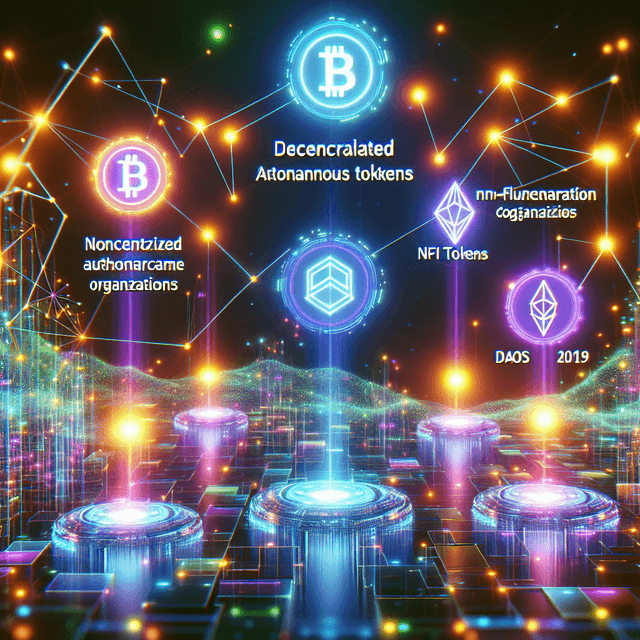
"Unlocking Web3: Innovations Driving the Future of Decentralization"
Unlocking Web3: Innovations Driving the Future of Decentralization
The future of Web3 is bright, fueled by remarkable innovations that enhance decentralization. Advances in Layer 2 scaling solutions have drastically improved transaction speeds and reduced costs for decentralized applications (dApps), making them more accessible. As decentralized finance (DeFi) and non-fungible tokens (NFTs) gain popularity, user engagement continues to soar, evident in the creation of over 200 million unique wallet addresses in 2025—a staggering 50% increase. Looking ahead, projections indicate that by 2030, 30% of all financial transactions will occur on decentralized networks, propelled by increasing consumer trust and clearer regulatory frameworks. However, challenges such as regulatory uncertainty and security vulnerabilities must be addressed to ensure broader adoption. The rise of decentralized autonomous organizations (DAOs) presents a promising opportunity for innovative governance models, empowering communities to manage projects collectively. As major financial institutions invest in Web3 startups, the integration of decentralized technologies into traditional finance is on the horizon, marking a significant shift in the industry.
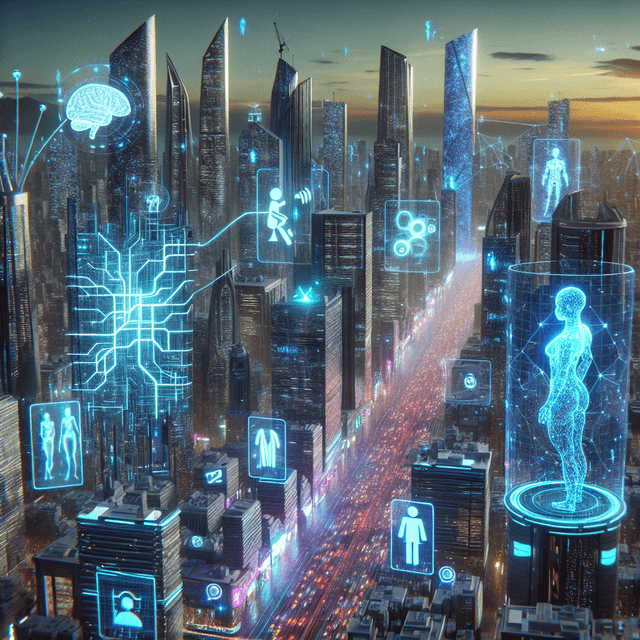
"Unlocking AGI: Innovations Shaping Our Future Today"
Unlocking AGI: Innovations Shaping Our Future Today
As we stand on the brink of a technological revolution, recent breakthroughs in neural architecture and unsupervised learning algorithms are significantly accelerating the development of Artificial General Intelligence (AGI). With over 60% of businesses projected to integrate AGI solutions into their operations by 2025, the potential for enhanced productivity and decision-making is immense. Current trends show that collaboration between tech giants and academic institutions is fostering rapid advancements, leading to practical applications in sectors like healthcare, finance, and education. However, the journey toward AGI is not without challenges. Ethical concerns and regulatory frameworks are struggling to keep pace with these advancements, raising important questions about accountability. As experts predict that AGI will achieve human-like cognitive abilities by the late 2020s, industries must prepare for both disruptions and opportunities—ranging from job displacement to the creation of new roles in software development and ethical AI consulting. The future of AGI holds great promise, but it demands careful consideration of its implications on society.
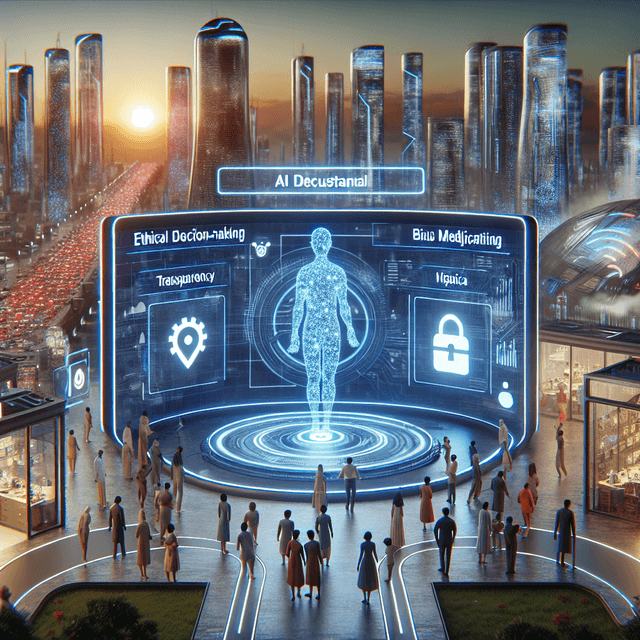
"Mastering AI Ethics: A How-To for Innovators"
Navigating the Future: Mastering AI Ethics for Innovators
As we navigate the evolving landscape of artificial intelligence, mastering AI ethics has become paramount for innovators. Recent advancements in ethical AI frameworks emphasize transparency and accountability, facilitating responsible decision-making across sectors. With over 70% of companies establishing AI ethics guidelines, the demand for ethical AI training and governance structures continues to rise, ensuring that innovation aligns with societal values. Looking ahead, ethical AI compliance is anticipated to become a regulatory requirement by 2027, fundamentally shaping product development and corporate strategies worldwide. However, challenges such as bias in AI systems persist, necessitating ongoing efforts to promote fairness and equity. Innovators who prioritize ethical AI not only foster trust and consumer loyalty but also tap into emerging opportunities in consulting services, positioning themselves at the forefront of responsible innovation in an increasingly conscientious market.
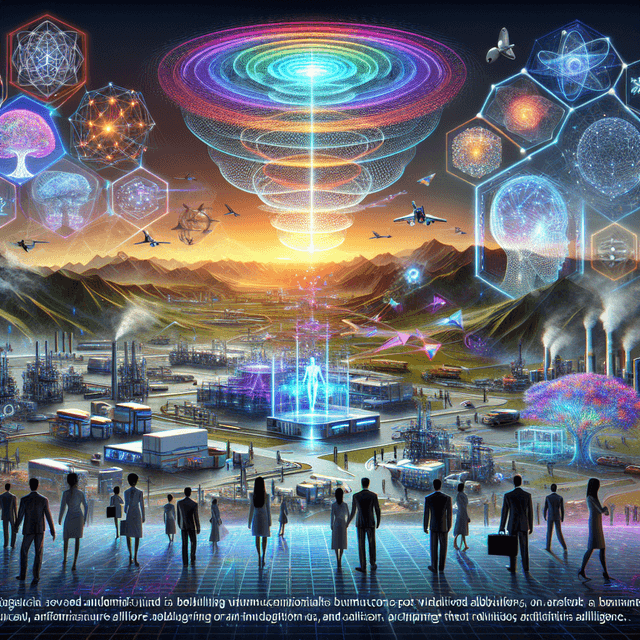
"AI Breakthroughs: Shaping the Future of Tech Culture"
AI Breakthroughs: Shaping the Future of Tech Culture
Recent innovations in artificial intelligence, particularly in natural language processing and computer vision, are revolutionizing how we interact with technology. These advancements have led to AI systems that can generate human-like content, making automation more intuitive and user-friendly. As industries increasingly integrate AI, over 75% of enterprises report heightened productivity, showcasing AI’s potential to enhance efficiency across sectors such as healthcare, finance, and customer service. Looking ahead, predictions suggest that by 2025, AI technologies will surpass human capabilities in specific tasks, fundamentally changing job landscapes and skill requirements. However, this rapid evolution comes with challenges, including ethical concerns surrounding AI bias and data privacy. Addressing these issues will be crucial as we embrace the emerging opportunities in AI-driven roles, emphasizing the necessity for skilled professionals in AI ethics and development. As AI continues to reshape our tech culture, it fosters innovation and competitiveness, paving the way for a future that balances progress with responsibility.
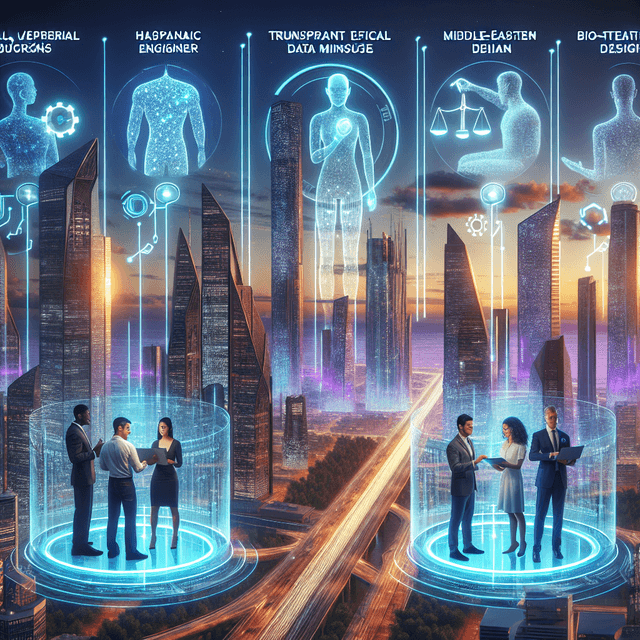
"Navigating the Future: Ethics in AGI Development Today"
Navigating the Future: Ethics in AGI Development Today
As we stand on the brink of revolutionary advancements in artificial general intelligence (AGI), the ethical considerations surrounding its development have never been more crucial. Recent innovations in explainable AI have significantly enhanced transparency, enabling users to better grasp AGI decision-making processes. Coupled with the fact that over 70% of organizations have adopted AI ethics frameworks, we are witnessing a paradigm shift in how tech companies and policymakers collaborate to shape ethical guidelines for AGI initiatives. Looking ahead, AGI is poised to substantially boost productivity across various sectors, with predictions suggesting a potential doubling of economic output by 2030. However, this progress comes with challenges, particularly in ensuring data privacy and security, as AGI systems increasingly collect vast amounts of personal information. The transformation of job roles and the demand for more technical skills underscore the need for a workforce adept at navigating this new landscape, further creating opportunities for AGI ethics consultants to guide responsible development.
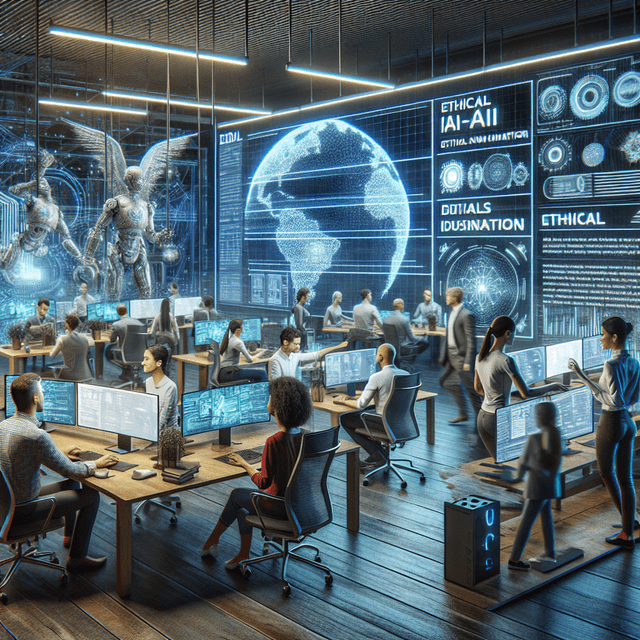
"Revolutionizing Startups: AI Innovations Driving the Future"
AI Innovations: The Future of Startups
In today's fast-paced business environment, AI innovations are revolutionizing startups by enhancing productivity and driving operational efficiency. Recent statistics reveal that approximately 70% of startups now leverage AI technologies, leading to a remarkable 30% increase in both operational efficiency and revenue. From personalized marketing to customer service chatbots, AI is enabling startups to automate processes and make data-driven decisions with unprecedented speed and accuracy. As we look toward 2025, the landscape is set to evolve even further, with predictions indicating that over 90% of new ventures will incorporate AI-driven solutions into their core strategies. However, challenges such as data privacy and ethical considerations remain critical hurdles. Startups that prioritize ethical AI applications and transparency are likely to capture significant market share in this rapidly changing environment, ultimately reshaping traditional business models and fostering innovation across various sectors. The future is bright for startups harnessing the power of AI, driving both growth and responsible technology solutions.
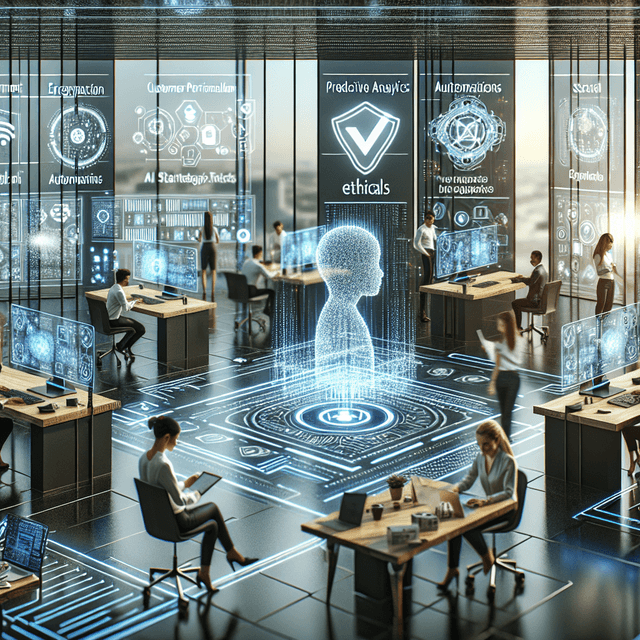
"Unlocking the Future: AI Innovations Transforming Startups Today"
Unlocking the Future: AI Innovations Transforming Startups Today
In today's fast-paced business landscape, startups are harnessing the power of AI to transform their operations and enhance customer experiences. By utilizing advanced AI tools for customer personalization, predictive analytics, and automation, these ventures are streamlining processes and achieving remarkable results. A staggering 75% of startups report increased efficiency, while 60% note improved customer satisfaction thanks to AI integration. As we look to the future, it's predicted that by 2025, 90% of new startups will leverage AI technologies to gain a competitive edge. However, challenges remain, including high initial costs and concerns over data privacy. Startups that prioritize ethical AI practices and transparency are likely to attract both consumers and investors seeking responsible technology solutions in the digital landscape. The rise of AI is not just reshaping individual businesses; it's driving innovation across industries and creating new market opportunities.

nft
What Are NFTs?
Non-Fungible Tokens (NFTs) have revolutionized the digital art and collectibles landscape, offering unique opportunities for creators and collectors alike. NFTs are unique digital assets verified using blockchain technology, typically representing digital art, music, videos, or other digital goods. Unlike traditional cryptocurrencies like Bitcoin or Ethereum, which are fungible and can be exchanged on a one-to-one basis, NFTs are non-fungible, meaning each token is distinct and cannot be replaced by another. ### How Do NFTs Work? NFTs are built on blockchain platforms, with Ethereum being the most prevalent. They utilize smart contracts to establish ownership and manage transactions. When an NFT is created, or "minted," it is recorded on the blockchain, providing a permanent and unalterable proof of ownership. ### Why Are NFTs Valuable? The value of NFTs stems from their uniqueness and the ability to verify ownership of digital assets. This uniqueness can be attributed to the digital content itself or the specific rights and privileges associated with the NFT. For instance, some NFTs grant access to exclusive events or communities, while others may represent ownership of virtual real estate or digital art pieces. ### How to Get Started with NFTs 1. **Set Up a Digital Wallet**: To interact with NFTs, you'll need a cryptocurrency wallet that supports NFT standards, such as MetaMask. 2. **Fund Your Wallet**: Purchase cryptocurrency (typically Ethereum) to fund your wallet. This can be done through exchanges like Coinbase or Binance. 3. **Explore NFT Marketplaces**: Platforms like OpenSea, Rarible, and Mintable allow you to browse, buy, and sell NFTs. These marketplaces host a wide array of digital assets, from art and music to virtual real estate. 4. **Create or Purchase NFTs**: If you're a creator, you can mint your own NFTs by uploading your digital content to a marketplace and following the platform's minting process. If you're a collector, you can purchase NFTs directly from these platforms. ### Tips for Navigating the NFT Space - **Do Your Research**: Before purchasing an NFT, investigate the project's background, the creators involved, and the community supporting it. This due diligence can help you make informed decisions and avoid scams. - **Understand the Costs**: Be aware of the fees associated with NFT transactions, including gas fees (transaction costs on the blockchain) and platform commissions. - **Stay Informed**: The NFT landscape is rapidly evolving. Keeping up with the latest trends, news, and regulatory changes is crucial. Engaging with reputable NFT blogs and podcasts can provide valuable insights. By immersing yourself in the NFT community and continuously educating yourself, you can effectively navigate and capitalize on the opportunities within this dynamic digital frontier.
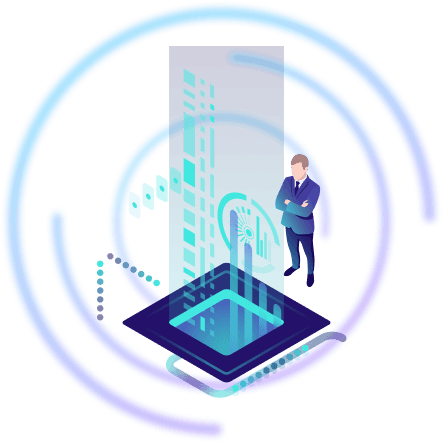
technology
Do this and don't get replaced by AI.
In today's rapidly evolving tech landscape, AI is reshaping industries and job markets. But rather than fear it, you can ensure your place in the workforce by focusing on skills that AI cannot easily replicate. 1. **Embrace Creativity**: AI is great with patterns, but creativity and innovation are still very human. Cultivate your ability to think outside the box and generate novel ideas. 2. **Sharpen Emotional Intelligence**: Jobs that require empathy, communication, and human interaction remain critical. AI can process data, but it can't navigate complex emotions and relationships. 3. **Stay Adaptable**: The future of work will be dynamic. Constantly learning and adapting to new technologies will keep you ahead of the curve. AI isn't here to take over; it's here to assist. Those who thrive will be those who embrace it as a tool while honing uniquely human skills.
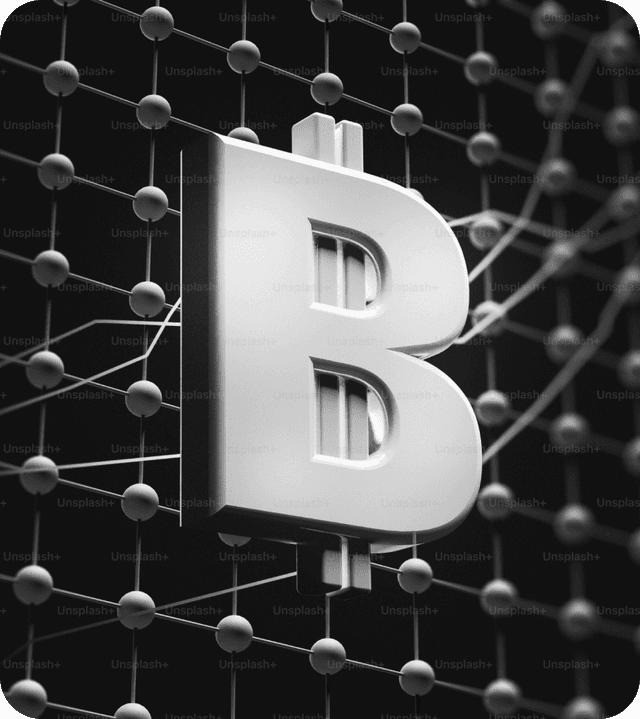
fantasy
How blockchain works under the hood?
**Lorem Ipsum** is simply dummy text of the printing and typesetting industry. Lorem Ipsum has been the industry's standard dummy text ever since the 1500s, when an unknown printer took a galley of type and scrambled it to make a type specimen book. It has survived not only five centuries, but also the leap into electronic typesetting, remaining essentially unchanged. It was popularised in the 1960s with the release of Letraset sheets containing Lorem Ipsum passages, and more recently with desktop publishing software like Aldus PageMaker including versions of Lorem Ipsum. \ **Lorem Ipsum** is simply dummy text of the printing and typesetting industry. Lorem Ipsum has been the industry's standard dummy text ever since the 1500s, when an unknown printer took a galley of type and scrambled it to make a type specimen book. It has survived not only five centuries, but also the leap into electronic typesetting, remaining essentially unchanged. It was popularised in the 1960s with the release of Letraset sheets containing Lorem Ipsum passages, and more recently with desktop publishing software like Aldus PageMaker including versions of Lorem Ipsum. \ **Lorem Ipsum** is simply dummy text of the printing and typesetting industry. Lorem Ipsum has been the industry's standard dummy text ever since the 1500s, when an unknown printer took a galley of type and scrambled it to make a type specimen book. It has survived not only five centuries, but also the leap into electronic typesetting, remaining essentially unchanged. It was popularised in the 1960s with the release of Letraset sheets containing Lorem Ipsum passages, and more recently with desktop publishing software like Aldus PageMaker including versions of Lorem Ipsum. \ **Lorem Ipsum** is simply dummy text of the printing and typesetting industry. Lorem Ipsum has been the industry's standard dummy text ever since the 1500s, when an unknown printer took a galley of type and scrambled it to make a type specimen book. It has survived not only five centuries, but also the leap into electronic typesetting, remaining essentially unchanged. It was popularised in the 1960s with the release of Letraset sheets containing Lorem Ipsum passages, and more recently with desktop publishing software like Aldus PageMaker including versions of Lorem Ipsum.


